Discover the 10 best CMS platforms for SEO in 2025!
Investing in the best content management system (CMS) for SEO is crucial to increasing your website’s ranking and visibility online. Not all CMS platforms are built alike. Specific ones cater to e-commerce, corporate websites, blogging, various forms of media, and more. Content management systems have transformed the digital landscape to be more user-friendly and simple to navigate for even the least tech-savvy individual.
Some platforms allow you to build a website and manage your content within minutes, while others require a development team to get you up and running. No matter what CMS platform you choose, selecting the best one that caters to SEO is essential. According to industry research, SEO drives more organic traffic than social media. A proper CMS and smart SEO play a significant role in digital marketing and website management.
Diving into the world of content management systems and SEO might seem overwhelming, but worry not. This blog post will list the 10 best CMS platforms for SEO, and we'll follow that up with why a CMS matters for SEO, what makes a CMS SEO-friendly, and the essential CMS features for SEO improvement. With not much further ado, here are our choices for the top 10.
When choosing the right CMS platform for SEO, the consensus is that a CMS should offer customization, built-in SEO tools, analytics, and simple navigation for technical and non-tech-savvy users. Let's dive into the 10 best CMS platforms for SEO in 2025.
RebelMouse is one of the most intuitive CMS platforms for publishers. Known as a next-generation, enterprise-grade publishing platform, RebelMouse is a next-generation AI-enabled CMS that is an ideal choice for publishers looking to maximize their SEO strategies with integrative AI features, analytics, auto-updating sitemaps, and linking structures to help rank your content quickly.
RebelMouse is known for its SEO technology centered around the best practices for search, including detailed metadata that helps Google's site crawler identify, index, and bring traffic to your site. It often leads clients to experience traffic surges due to the easy-to-use interface that maximizes ranking potential from the user-friendly SEO extensions. These CMS qualities are just some of the reasons why RebelMouse is the best CMS for SEO.
RebelMouse's Entry Editor features an SEO section designed to help you optimize every post to give it the best shot at winning a targeted search phrase. Here's a glimpse into how it guides writers and editors through a perfected search strategy before clicking the "Publish" button.
 RebelMouse CMS
RebelMouse CMS
It can be tricky to nail down which search phrase you want to win. Within the SEO tab, the drop-down list suggests search phrases that are already performing well across Google Search, including each keyword’s monthly search volume. This helps you determine which phrases are easy to win, or perhaps too competitive to strategize for, on an article-by-article basis. Click here to read more about this feature.
Before You Publish:
Optimize Your URL Slug
 RebelMouse CMS
RebelMouse CMS
Optimize your URL slug to match your exact search phrase.
Craft Your Title Tag and Meta Description
 RebelMouse CMS
RebelMouse CMS
Determine your metadata with content recommendations and a character limit counter.
Pick Recirculation Links
 RebelMouse CMS
RebelMouse CMS
Select relevant links from your own site and around the web which leads to amazing traffic boosts.
RebelMouse has many integral features to keep your Core Web Vitals, cybersecurity, and content performing at their peak functionality.
WordPress offers multiple SEO plugins and tools as one of the most popular CMS platforms. It also provides a user-friendly interface and robust security features, ensuring your website is optimized for search engines. WordPress powers at least 43% of all websites worldwide, making it a popular platform. WordPress is also known as one of the best platforms for SEO due to its numerous customization elements, built-in features for creating URLs, alt texts, and SEO add-ons like Yoast SEO.
WordPress offers a page builder known as Elementor that has gained popularity by providing a user-friendly interface, a code-free platform for non-technical users, numerous pre-designed template themes, seamless compatibility across desktop and mobile, performance optimizations, and third-party integrations.
 WordPress CMS
WordPress CMS
WordPress is well known for its SEO-friendly features and functionality, such as plugins. Both the premium and free versions of WordPress include the Yoast SEO plugin, which assesses the quality of your search phrase, metadata length, alt text images, keywords, and other factors. Many users believe WordPress is one of the best content management systems for SEO due to its popular and simple interface.
 WordPress CMS
WordPress CMS
Drupal offers advanced SEO features, including customizable URLs and schema markup support. It provides a responsive design and robust security features, making it a top CMS choice for SEO. The key factors that make Drupal so appealing are flexibility and customization, the ability to handle large quantities of content and data, premium security protection, a free, open-source CMS that can handle minor or complex website themes, and integrative capabilities with e-commerce platforms and CRM software.
What makes Drupal a good CMS for SEO is a codebase that makes creating well-structured data easier for search engines to crawl and index content. Like WordPress, Drupal offers SEO plugins like Yoast SEO and other tools for optimizing on-page SEO elements. The taxonomy system allows website owners to organize and categorize content effectively, helping search engines understand content relationships. Although Drupal is an SEO-friendly website builder, it can have a complicated setup process requiring a skilled professional or team.
 Drupal CMS
Drupal CMS
Magento is a popular CMS for e-commerce businesses, web developers, retailers, and enterprise companies. These professionals choose Magento for their e-commerce needs due to its customization and scaling capabilities. Magento offers many SEO benefits for customizing URLs and metadata to provide more control to users looking to optimize their content. Magento supports structured data and auto-generating XML sitemaps, making it easier for search engines to discover pages efficiently and index them.
Magento is a powerful and highly specialized CMS designed for e-commerce websites. Businesses that want advanced customization, scalability, and SEO skills for their online stores choose it. Its extensive feature set, large community base, and focus on speed optimization make it an excellent choice for SEO-focused e-commerce businesses of all sizes.

 Magento CMS
Magento CMS
HubSpot CMS Hub is built for marketers, developers, content creators, enterprises, and more. This CMS offers a secure and seamless experience for marketing system integrations and responsive web designs built for compatibility with mobile and desktop devices. HubSpot CMS Hub provides a simple-to-use interface for quick navigation, a drag-and-drop editor to manage and edit content easily, and customizable pages and themes. This CMS is ideal for the everyday blogger or a corporate company aiming to expand its tools and streamline its marketing efforts.
HubSpot CMS Hub equips its users with SEO tools that make developing an effective search strategy easy. These tools offer recommendations for user traffic insights, provide reports on user trends and searches, and show you how your content stacks against competitors in the SERPs.
 HubSpot CMS
HubSpot CMS
Contentful is a headless CMS with an application programming interface (API), meaning it can communicate with other types of computer software and deliver content to multiple platforms and devices. Contentful offers marketers, developers, and creators a flexible and efficient way to manage content like text, videos, and images while integrating with multiple third-party tools and front-end systems. The types of users who benefit most from using Contentful include digital agencies, e-commerce businesses, and large corporations.
Contentful offers multiple content management features, making it an advantageous tool for SEO, such as structured content, tracking content changes and version control, high-speed content delivery, integration with third-party SEO tools, analytics, and optimizing URL slugs.
 Computan
Computan
Adobe Experience Manager (AEM) is an enterprise-grade CMS that delivers a personalized and robust content management experience. AEM combines content creation, marketing campaigns, and digital asset management under one platform through its multifaceted CMS features. AEM offers multi-site management, content creation tools for efficiently structuring text, and website performance tools.
AEM provides many useful SEO tools and features like Google Search Console verification, auto-fill metadata, and tags, which is helpful for content-heavy sites, and website performance metrics like Adobe Analytics to optimize and accurately structure content across multiple websites, making it an ideal CMS platform for SEO management.
 Adobe Experience Manager CMS
Adobe Experience Manager CMS
Wix is a user-friendly and feature-rich CMS that appeals to various users due to its beautiful website themes and simple-to-manage website functionality. Its built-in SEO capabilities, mobile responsiveness, and user-friendly interface make it an excellent alternative for anyone looking for a CMS that supports successful SEO strategies without needing professional coding or technical knowledge.
Wix is considered an SEO-friendly CMS due to its performance features, such as automatic image optimization and its CDN integration, improving site speed, a critical factor in SEO rankings. Wix offers meta tag customization, has a mobile-responsive design to increase SEO rankings on mobile devices, and features an SEO tool known as the Wix SEO Wiz. Wix SEO Wiz guides users through the SEO optimization process to help new users better understand SEO best practices.
 Wix CMS
Wix CMS
Squarespace is an all-in-one website builder and CMS designed to empower individuals, creative professionals, small businesses, and even larger organizations to create beautiful, functional websites easily. Squarespace is a user-friendly CMS that appeals to creative professionals, small businesses, and content creators looking for a visually appealing and SEO-friendly platform to build and manage their websites.
The platform's trendy templates, integrated hosting, and built-in SEO tools make it an excellent choice for users seeking a simple CMS for SEO optimization. Squarespace is one of the best platforms for SEO due to its SEO-friendly templates equipped with clean HTML code and automated mobile compatibility, hosting solutions that improve user experience, and integrated analytics for tracking user behavior and making data-driven SEO decisions.
 Squarespace CMS
Squarespace CMS
Joomla is a next-level CMS built for e-commerce, news publications, and large enterprises. Like WordPress, Joomla offers customizable templates for your website and includes various CMS tools that surpass many of its competitors.
If you own a media publication or e-commerce business and are looking to optimize your SEO strategy, Joomla is an ideal CMS to try. Users can modify their keywords, title tags, and URLs extension-free through Joomla's interface. Joomla contains many SEO tools to maximize link building, indexing, structured data for snippet features, and redirecting broken pages.
 Joomla CMS
Joomla CMS
CMS stands for content management system. It’s a software that allows you to develop, edit, and publish content, often without any technical expertise. The best content management systems for SEO will have a user-friendly interface, making modifying and uploading content easy. SEO stands for search engine optimization.
SEO is the practice of implementing keywords and phrases that people search for into your content to deliver the most relevant and accurate response to a user's question. A good SEO strategy brings more traffic to your website and brand, and highlights you as a trustworthy and credible figure in your industry, which Google and other search engines reward by placing you at the top of the search engine results page (SERP).
As a business owner, publisher, or digital marketer, you must utilize both effectively to ensure your website's success. A CMS makes managing your website's content easier, while an SEO strategy makes that content visible to your target audience.
A CMS is the foundation of your website. It will allow you to implement, modify, and edit posts, including keywords, title tags, images and meta descriptions, update pages, offer data analytics, and find and resolve technical SEO issues. A CMS matters for SEO because it affects how search engines find and rank your content online. A good CMS should make it easy to implement SEO strategies, optimize keywords, and create structured content for search engines to scan, crawl, and index your website. These measures will increase your chances of ranking number one for a specific search phrase.
Without these CMS features, your SEO efforts will fall short and affect your ability to organize. Moreover, a CMS also impacts user experience, a crucial factor in SEO. A CMS that offers a smooth and enjoyable user experience will result in higher engagement and retention, improving your website's SEO performance. In short, the best CMS for SEO makes it easy for search engines and users to navigate your website.
Now that you understand the concept of a CMS better, it's time to dive into some essential CMS features for SEO. You need more than just being able to modify keywords and content. Your CMS should come packed with tools that make optimizing content and fixing technical SEO concerns easier. These tools should help with keyword research, provide SEO suggestions and data analytics, and guide you through improving your online visibility and marketing performance.

The following are some ideal characteristics your CMS platform should have to meet your SEO demands:
On-page SEO is creating content that will help you rank higher. On-page SEO includes:
A good CMS will allow you to optimize these to help search engines like Google determine the intent of your topic. Title tags and meta descriptions have character limits to show search engines and users what the content will be about instantly. A decent CMS will alert you if you exceed a specific character limit and will provide ways to improve your text for increased exposure and traffic.
An ideal CMS will offer layout and design tool features that allow customization to easily change elements like color scheme, text, and font size to differentiate your brand from competitors. Additional CMS features include implementing videos, images, alt text, links, and structured content, as well as the ability to easily personalize titles, headers, URL slugs, and meta descriptions.
The URL slug is among the first places search engines crawl to determine page context. Lengthy or confusing URLs don't help the user experience and lead to poor page performance. Your CMS should help you customize your slug to be SEO-optimized. Keep your URLs short and only include your target keyword or search phrase.
When crawling pages, search engines look for structured data to offer readers relevant and thorough information. Structured data presents content in the most aesthetically appealing and scannable manner, contributing to featured snippets appearing at the top of organic search results. Marketers should search for a platform with data structure tools such as embed codes for links and videos, drag-and-drop editors, call-to-action buttons, table of contents, and more.
Core Web Vitals measure aspects of web performance that directly impact user experience, including page load speed, interactivity, and visual layouts. A CMS that prioritizes these metrics ensures that the website and published content deliver a fast and smooth browsing experience, which is crucial for retaining and engaging users. Google has stated that Core Web Vitals are a ranking factor for its algorithm. The best SEO CMS helps websites achieve better Core Web Vitals scores, contributing to higher search engine rankings and increased organic traffic for businesses and individuals.
SEO is more in depth than simply implementing keywords. Technical SEO involves improving the technical components of a website to improve rankings and overall site performance. A website with poor technical SEO may suffer from slow page speed, low online visibility, broken pages and links, and poor site quality that may leave users unengaged and frustrated. A CMS platform should offer tools that report or allow you to fix technical issues such as toxic links quickly. The most important aspects of technical SEO include:
With artificial intelligence (AI) on the rise, it's crucial for a CMS platform to offer AI integrations that allow seamless content generation, automation, and optimization. More CMS platforms are updating their interface to offer AI features to enhance content development and bring more value to users.
Some CMS platforms provide elementary SEO features, but the real magic lies in advanced SEO tools like plugins and extensions. A proper CMS should offer SEO extensions like keyword search phrase suggestions, analytics and search volume for a particular keyword, linking automation, and schema markup updates. A CMS that provides no SEO tools leaves users at a disadvantage against their competitors.
When something goes wrong with your CMS, such as an uptime problem, it's critical to have access to customer assistance. CMS solutions that provide 24/7 support or quick responses to user inquiries improve the user experience, increasing user retention and loyalty.
Creating and implementing a good SEO strategy takes time. To ensure that your website is on track, a good CMS should track performance indicators such as top keywords, indexed pages, popular content, user behavior, conversion tracking, and weekly and monthly traffic increases. A CMS with integrated analytics allows you to identify flaws in your SEO strategy and areas for improvement.
When selecting the correct CMS, the primary goal should be to provide users with a pleasant online experience. Visitors are more likely to stay and explore more of your content if your site has fast page speed, visually appealing layouts, smart navigation, and content that is relevant to their needs. While user experience may not directly correlate with SERP rankings, search engines like Google assess visitor traffic and time spent to help rank your site.
Creating the best SEO website requires a good understanding of SEO strategies and practices. To develop the best website, you need to follow these steps:
An ideal CMS supports your SEO approaches, making it easier for you to optimize your website for search engines and increased visibility. It should offer SEO plugins or tools, customizable URLs, schema markup support, and other essential features. It should also provide a user-friendly interface, robust security features, and excellent customer support.
RebelMouse's blazing-fast, AI-enabled CMS technology works for any site, whether you're a brand, a new media company, or a legacy publisher. SEO doesn't have to be something only developers and analysts can understand and augment. Our platform puts the power of a simple interface, SEO performance metrics, and integrated generative AI in the hands of content creators, editors, and social curators. So, are you ready to unlock top performance with the best CMS for SEO in 2025?
Start winning on search with every publish. Request a demo today, and let's start working together.
The Fastest Sites in the World Run on RebelMouse
Our platform is a complete digital publishing toolbox that's built for modern-day content creators, and includes game-changing features such as our:
RebelMouse sites reach more than 120M people a month, with an always-modern solution that combines cutting-edge technology with decades of media savvy. And due to our massive scale, 1 in 3 Americans have visited a website powered by RebelMouse.
Thanks to the tremendous scale of our network, we are able to analyze a wealth of traffic data that informs our strategies and allows us to be a true strategic partner instead of just a vendor.
We’re here to help you weigh and understand every tech and strategic decision that affects your digital presence. Spend less time managing everything yourself, and more time focused on creating the quality content your users deserve.
RebelMouse employs a unique, diverse, and decentralized team that consists of 70+ digital traffic experts across more than 25 different countries. We have no central office, and we cover every time zone to ensure that we’re able to deliver amazing results and enterprise-grade support around the clock.
Our team is well-versed in all things product, content, traffic, and revenue, and we strategically deploy ourselves to help with each element across all of our clients. We thrive on solving the complex.
Copyright © RebelMouse 2025
source

6 Top SEO Reporting Tools for Content Marketers – Exploding Topics
/in website SEO, Website Traffic/by Team ZYTBlog > 6 Top SEO Reporting Tools for Content Marketers
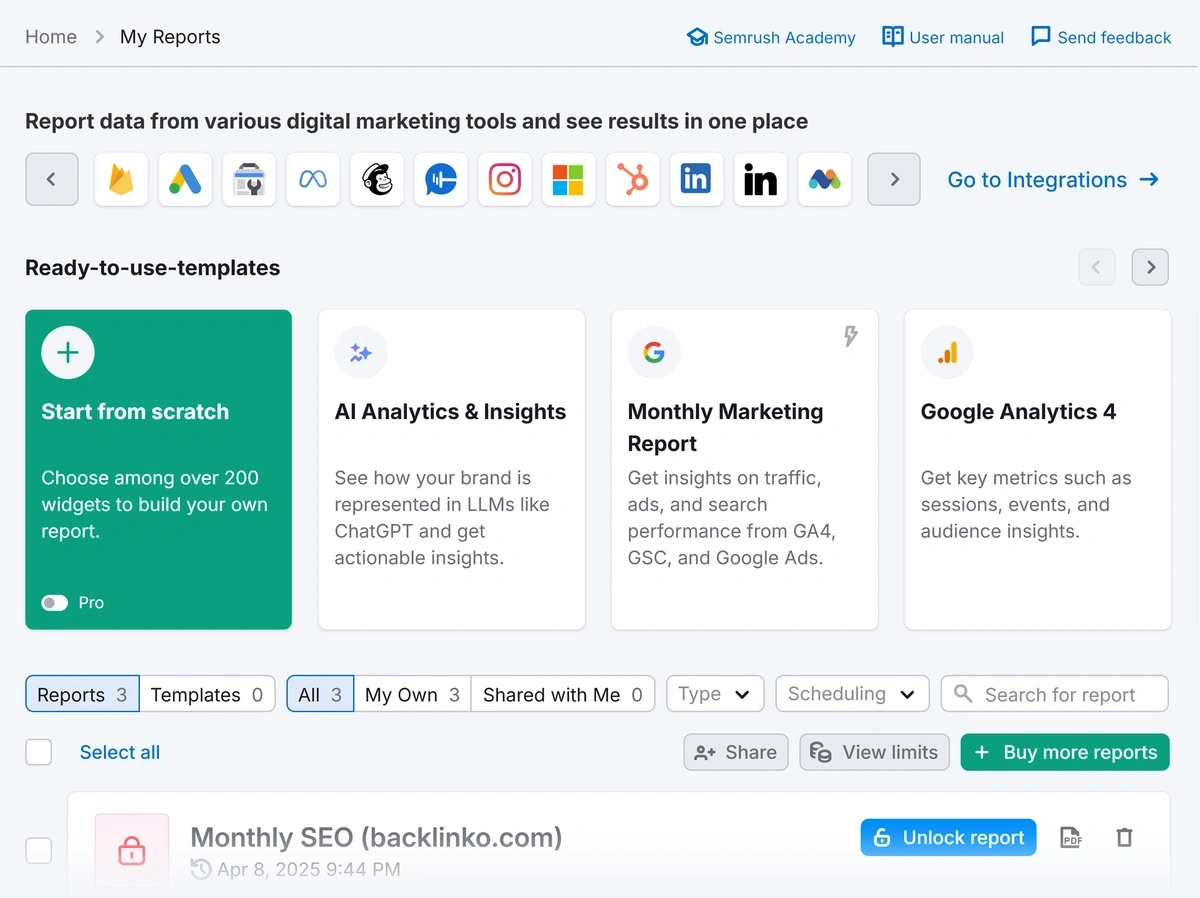
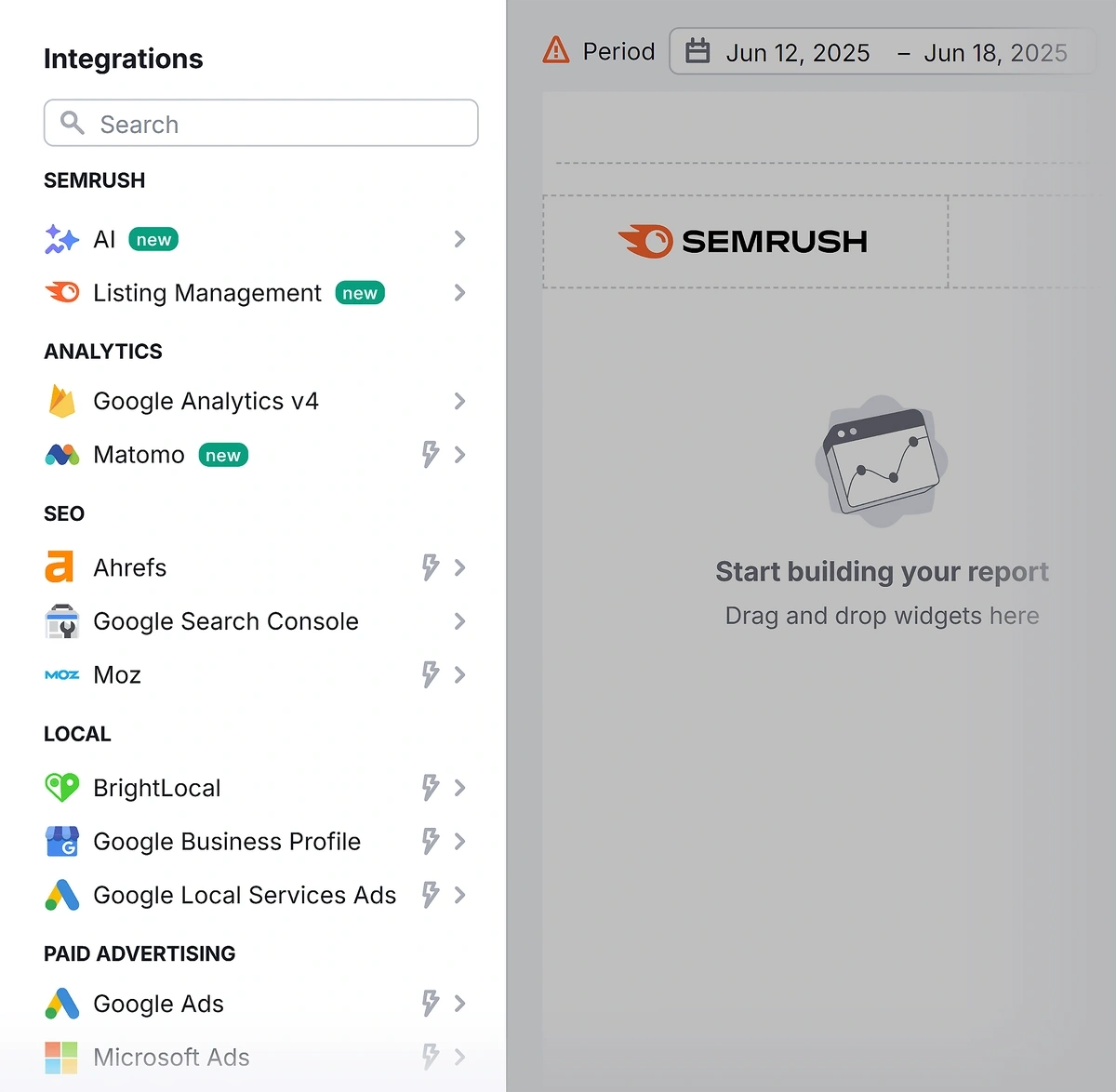
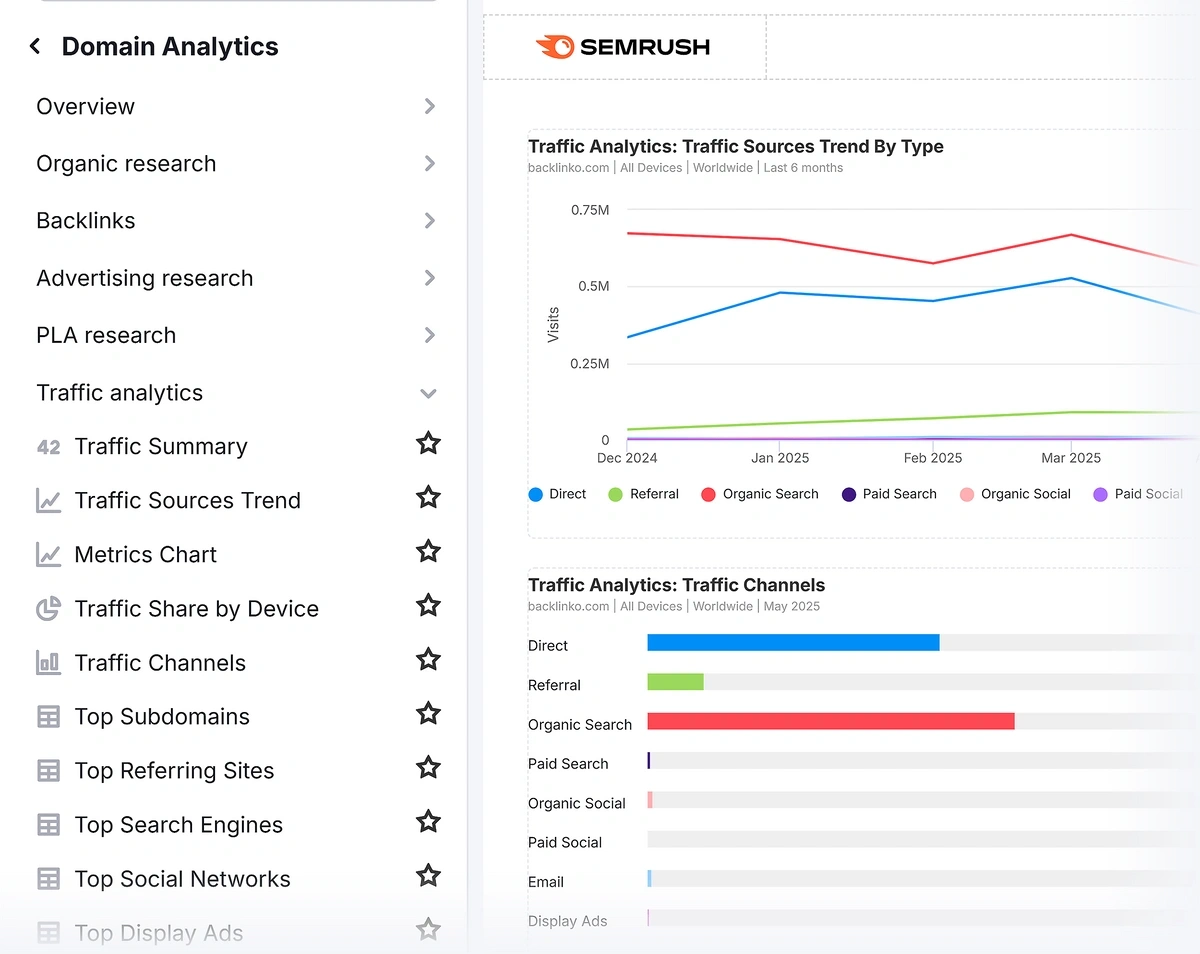
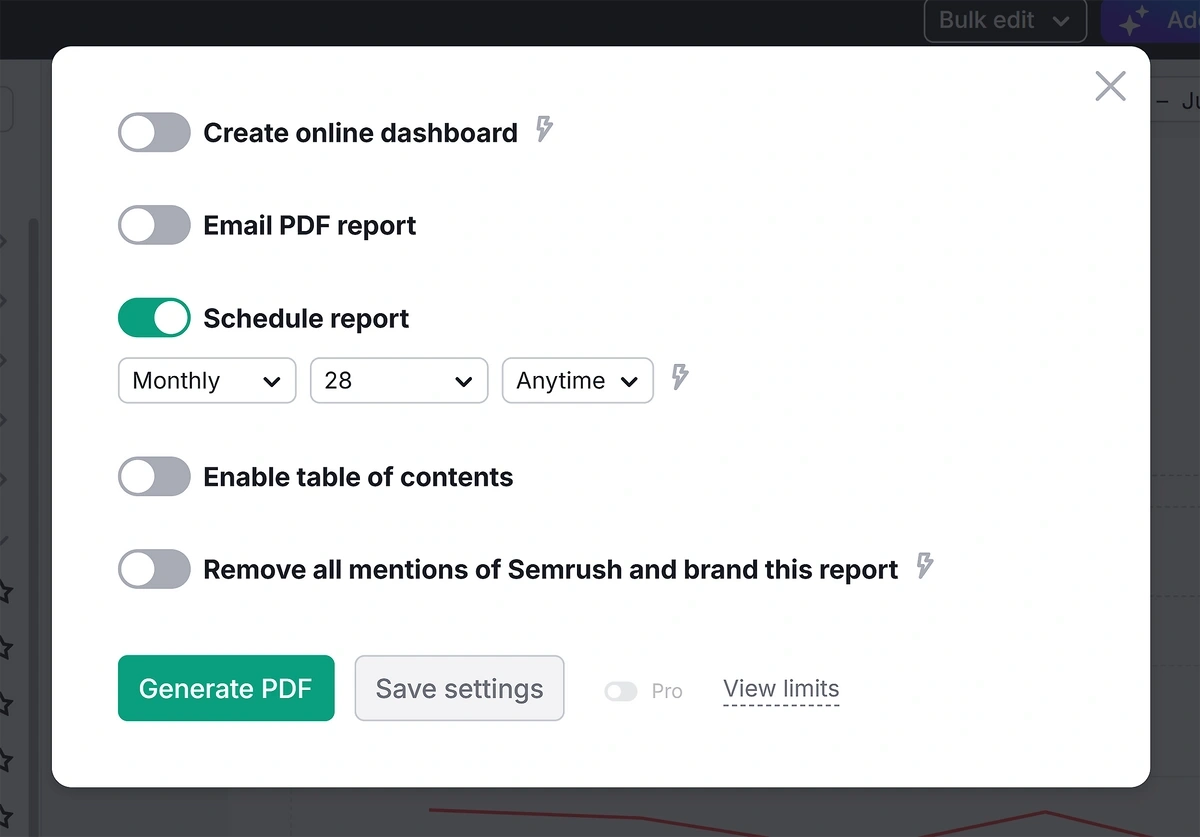

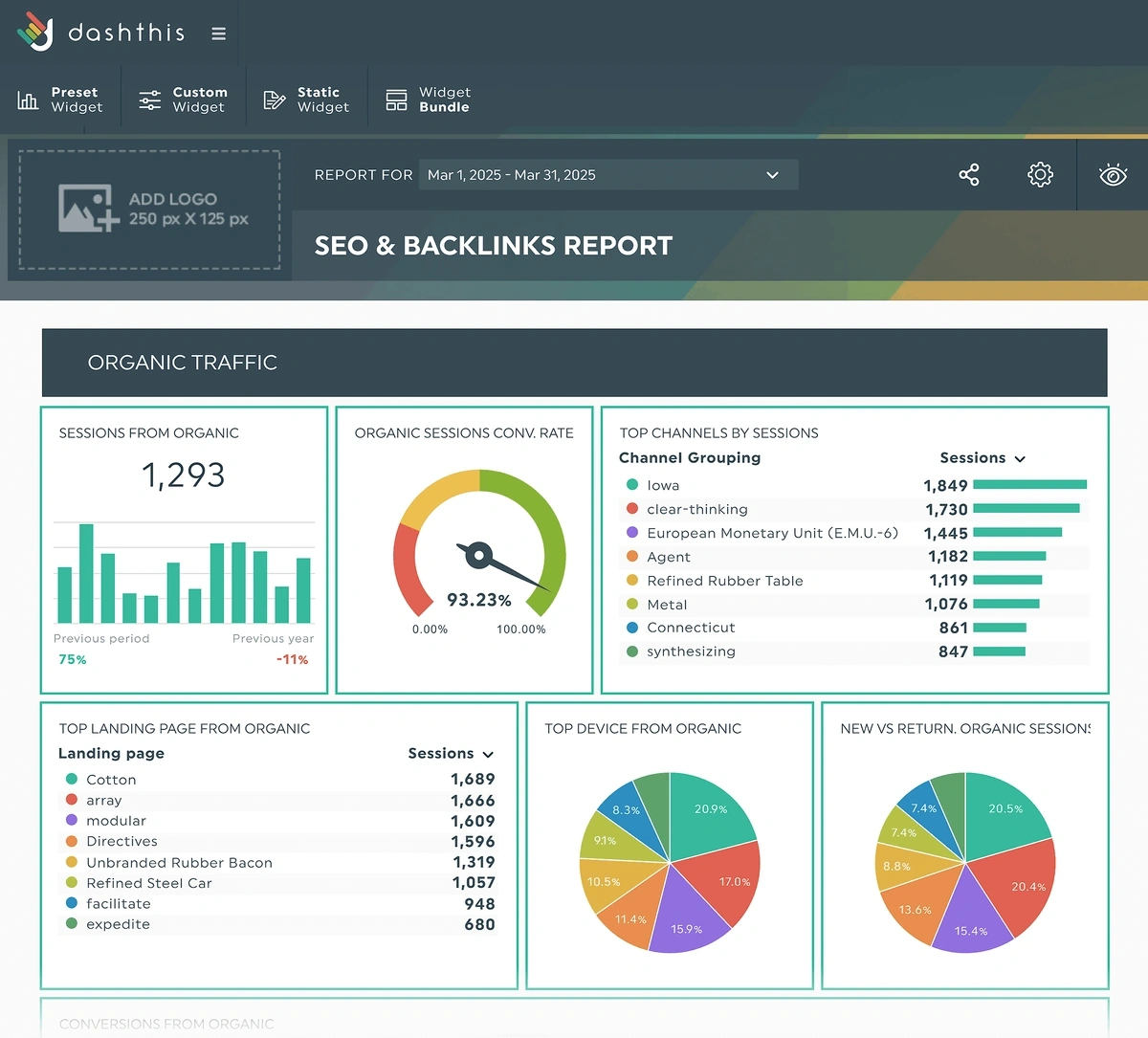
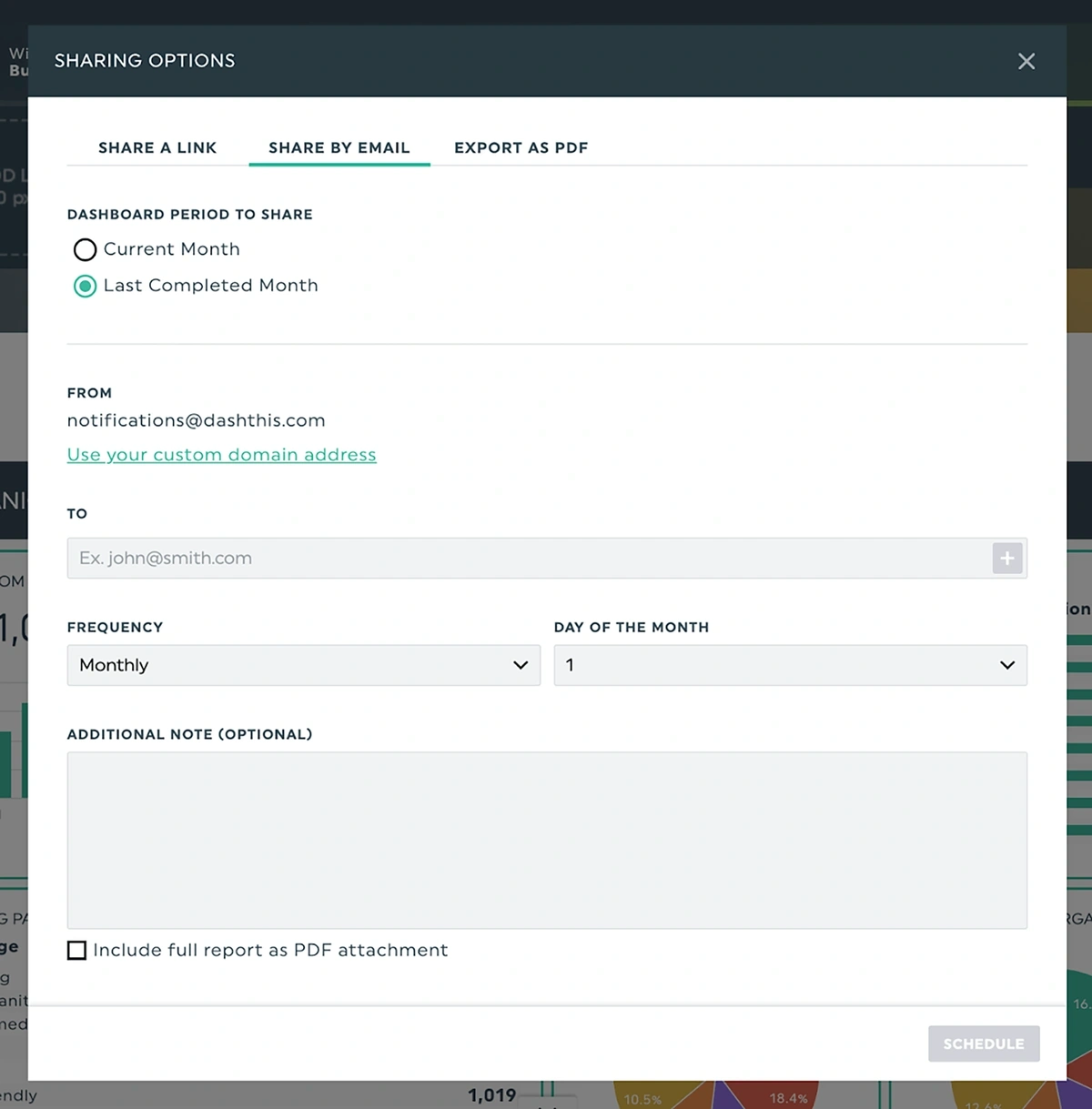
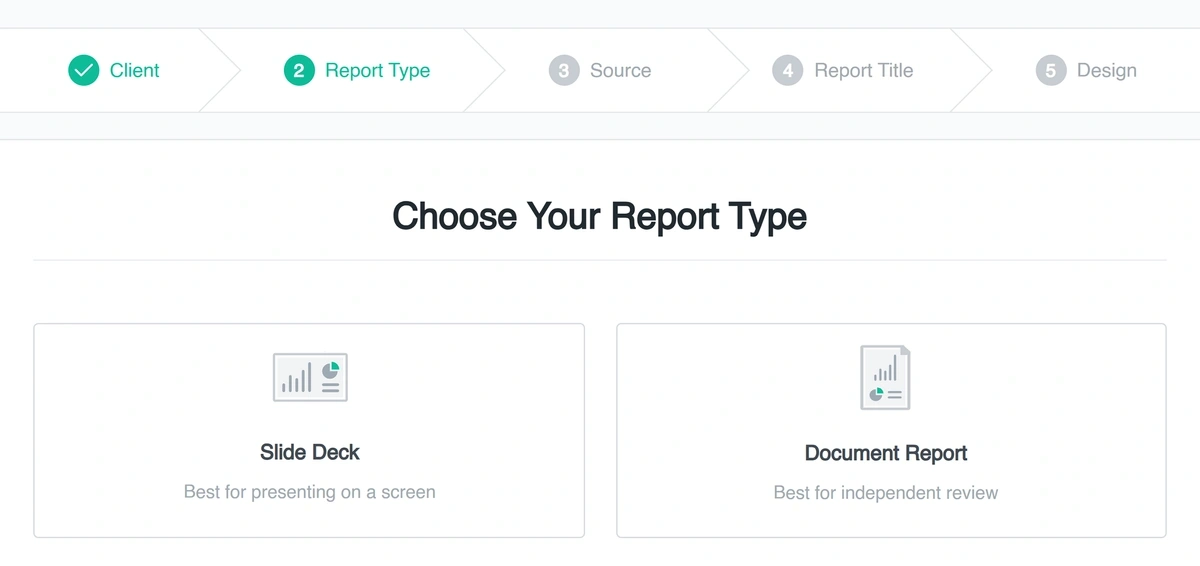
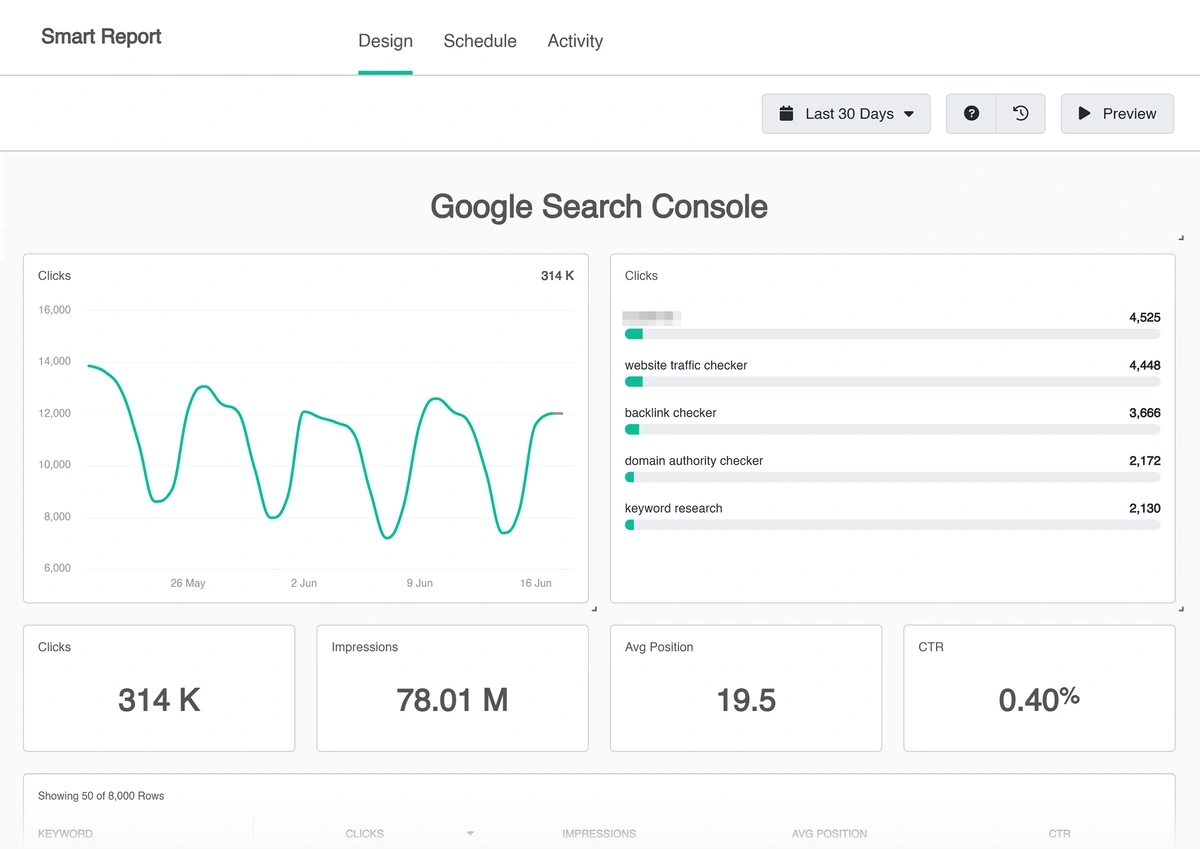
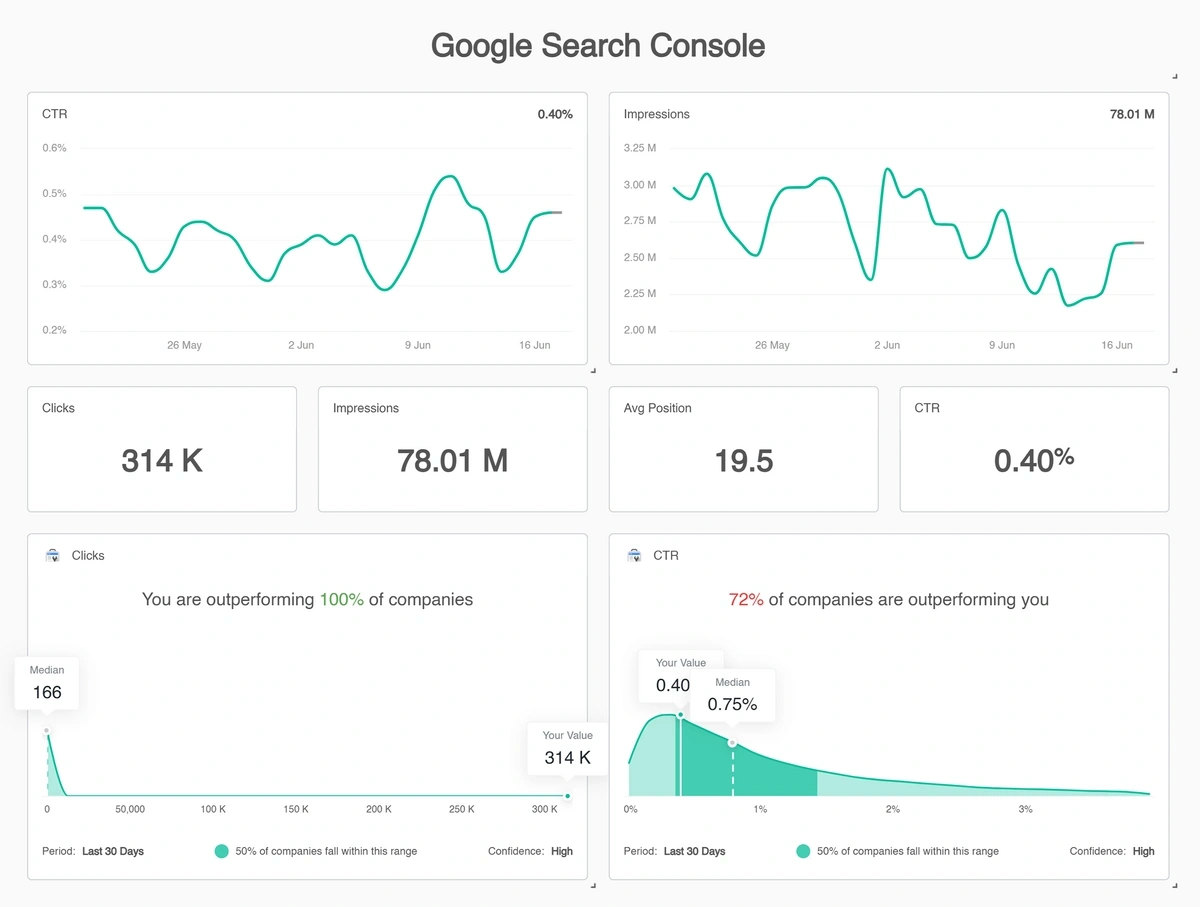
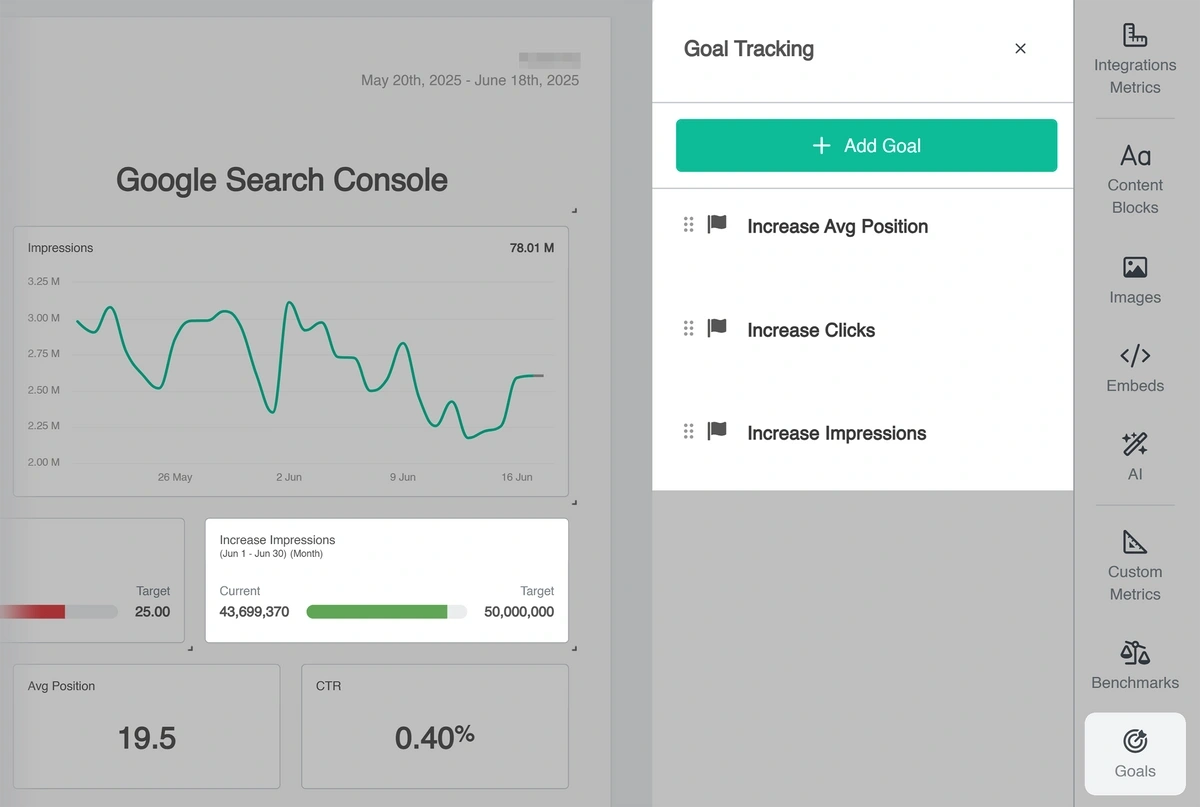
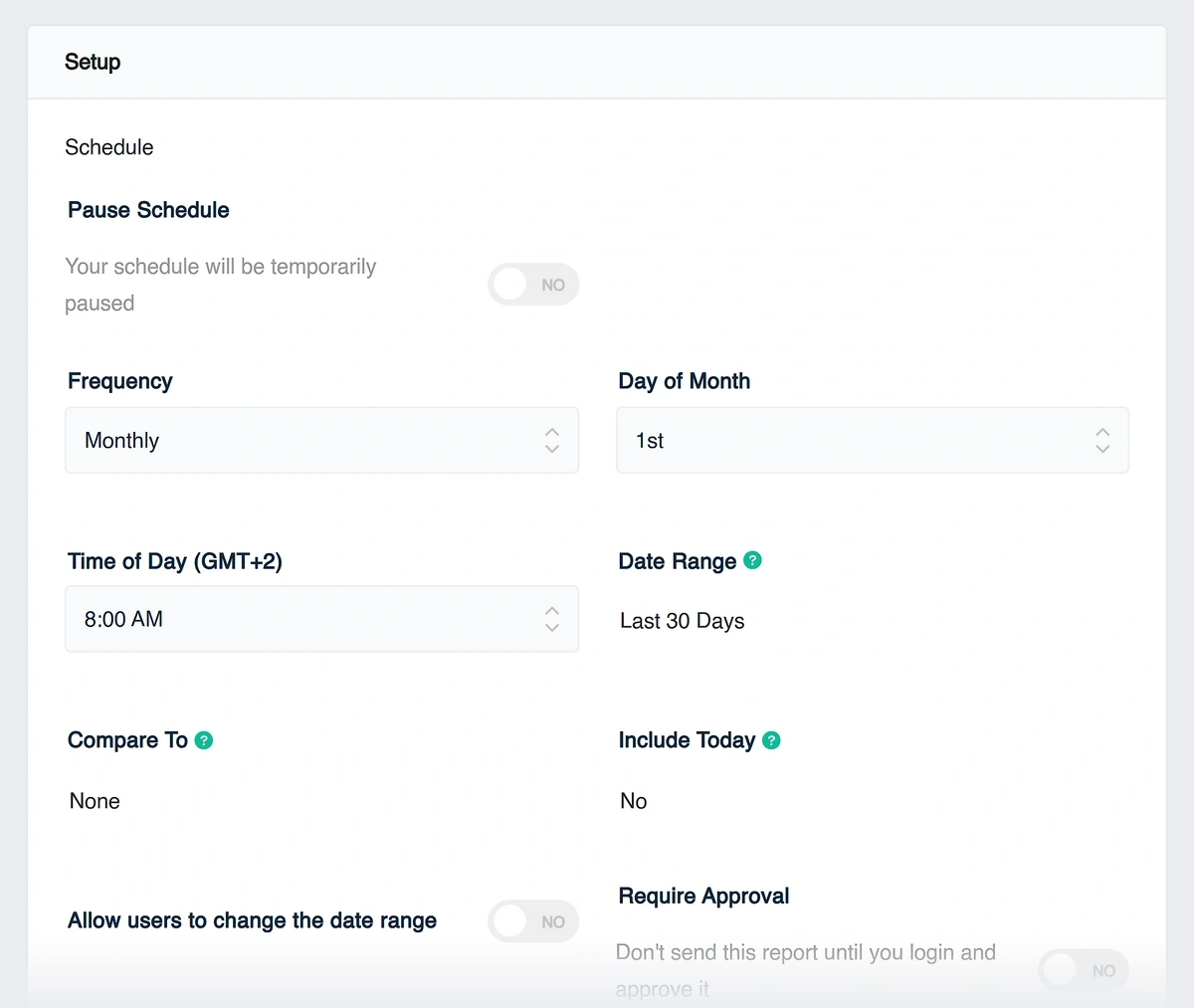
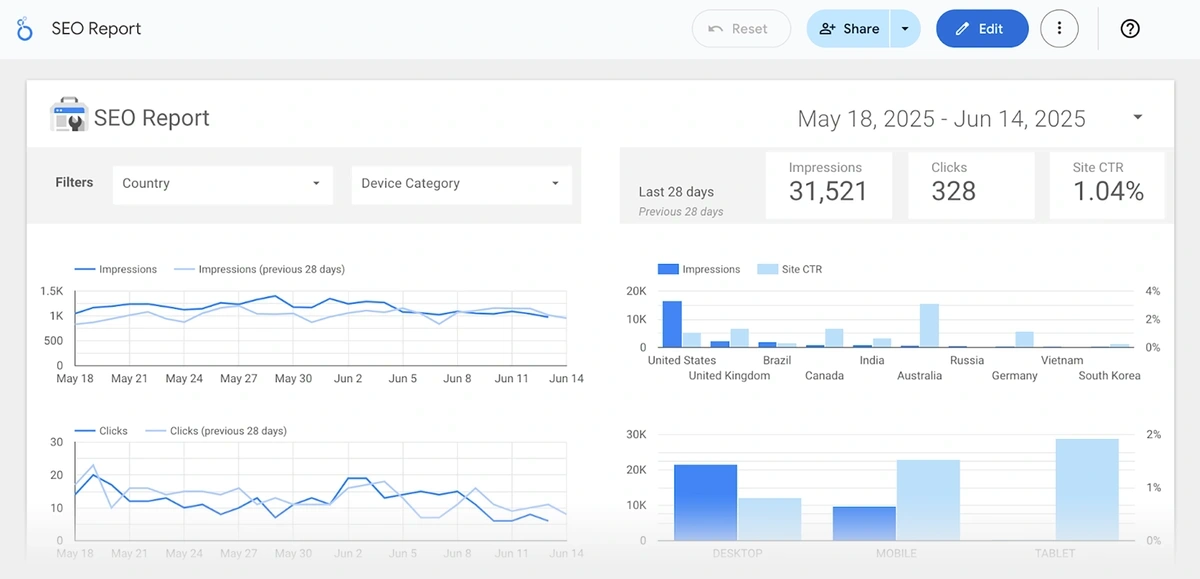
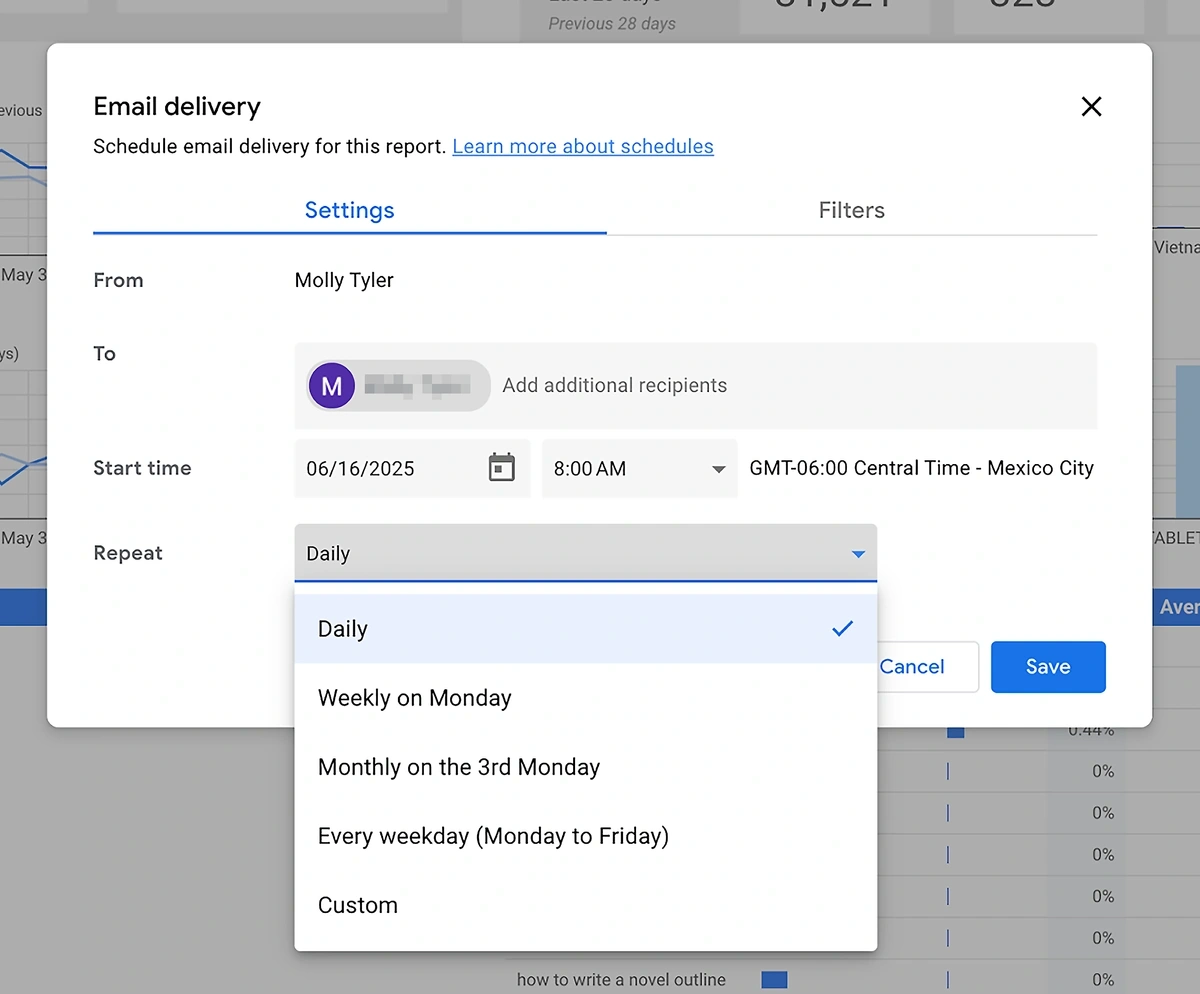
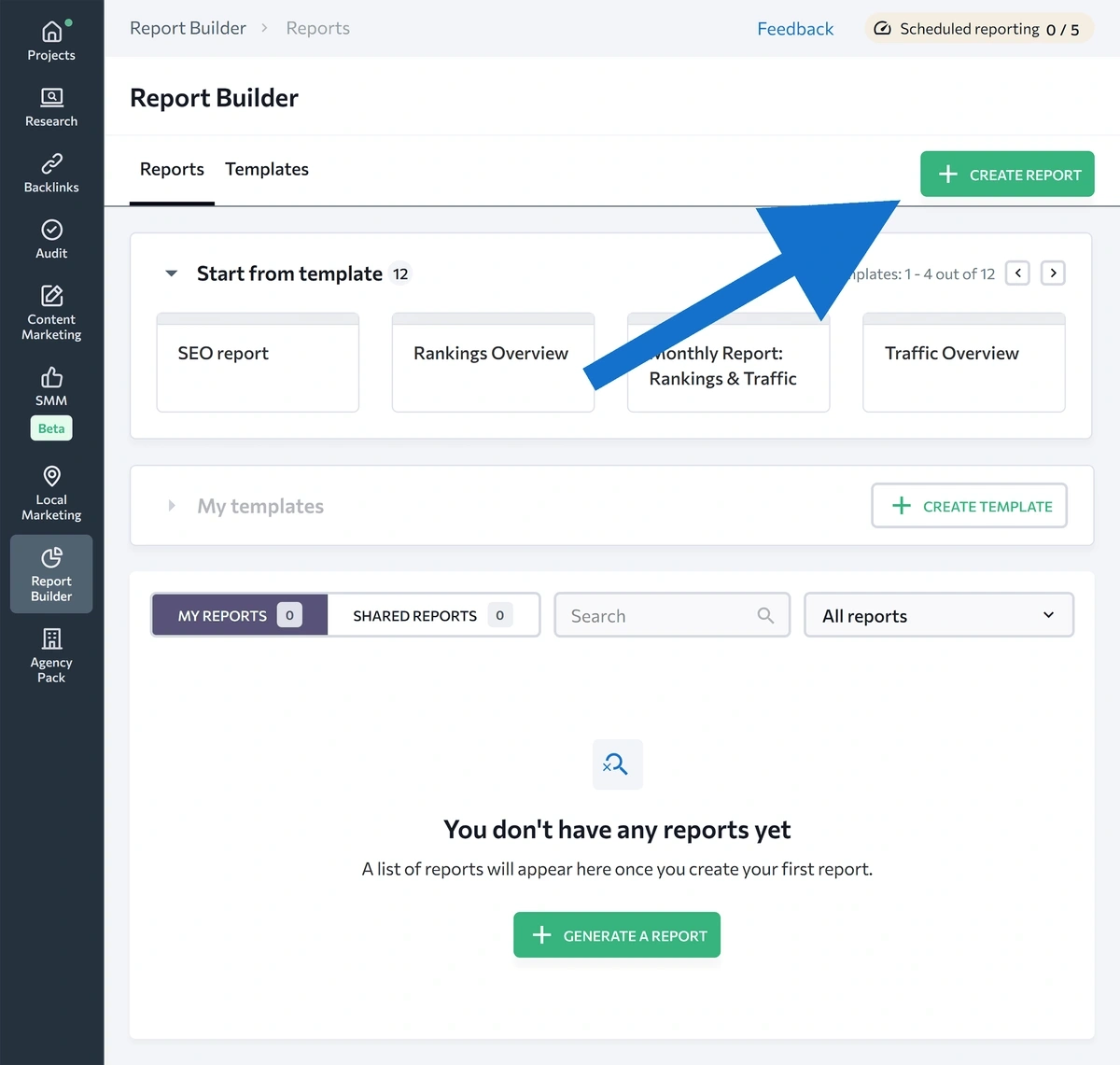
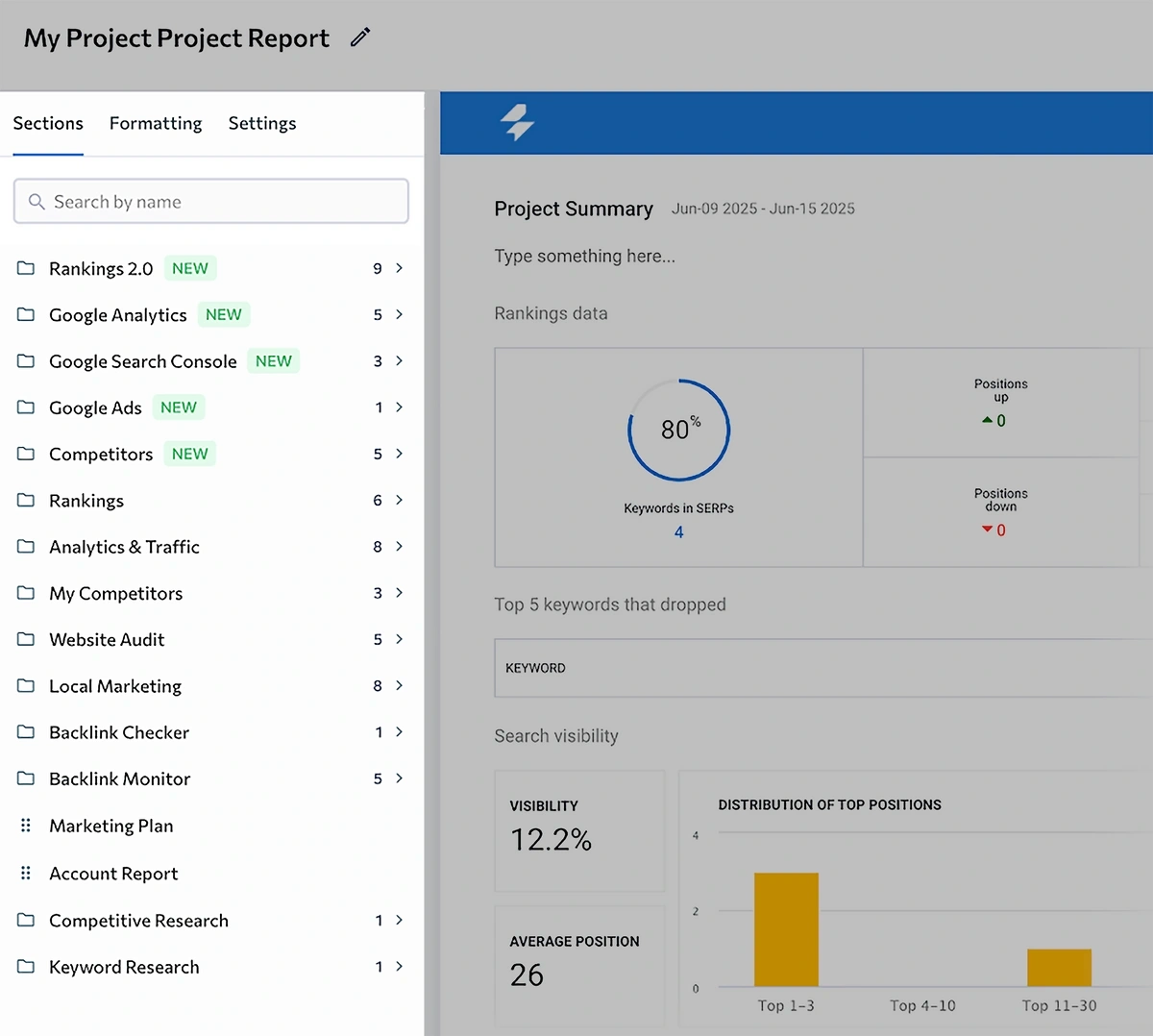
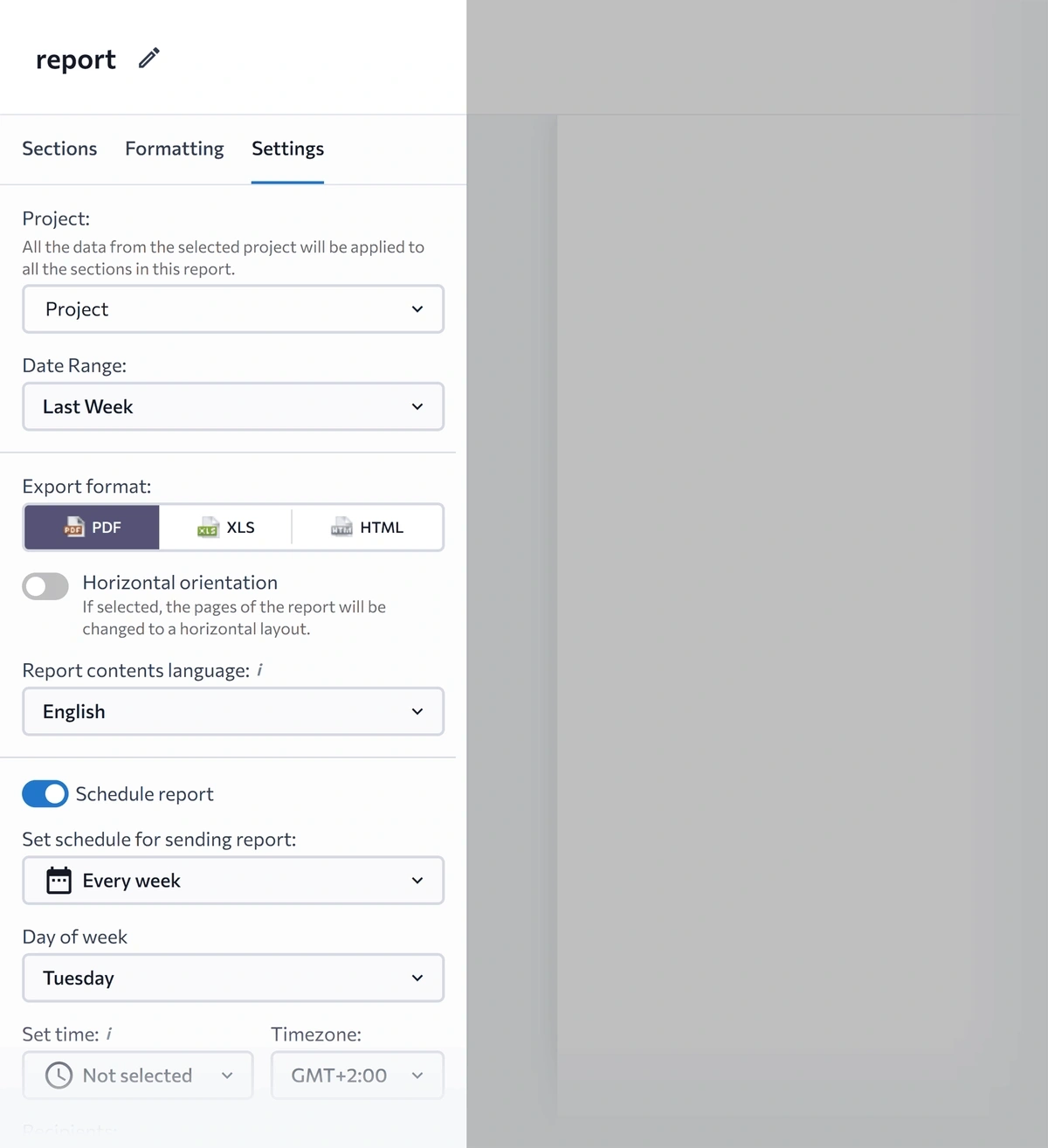

Contents:
Share:
As content marketers, we learn to speak the language of SEO.
Impressions, top queries, backlinks, domain authority—these words and the metrics that go along with them all have meaning to us.
Unfortunately, they might mean nothing to your clients.
Business owners care about ROI and their bottom line. In order to help them understand the value your marketing efforts bring to the table, you need comprehensive SEO reports that communicate your impact clearly and concisely.
Use trending keywords to create content your audience craves.
I’m someone who genuinely loves charts and graphs and color-coded-everything, so I get pretty excited about a good SEO reporting tool. I’ve used several for different projects I’ve worked on, and tested out some more to share my findings with you.
These tools make reporting much faster. You don’t have to waste time gathering data from multiple sources and compiling them into a report.
Semrush is an SEO and digital marketing platform.
It’s best known for its keyword research and competitor analysis tools, but it’s capable of a lot more.
With backlink analysis, full site audits, and rank tracking all built in, Semrush has all the information you need to create comprehensive SEO reports in one place.
The My Reports feature is helpful for communicating SEO metrics to stakeholders or clients.
You can use data from many different sources, including:
There’s no extra setup, which makes this one of the easiest reporting tools to use.
You can build your report from scratch, or use one of the templates Semrush provides.
If you need to report on more than just SEO metrics, Semrush also offers several integrations. You can incorporate data from:
I especially like its AI metrics widgets. Reporting on how your brand is showing up in ChatGPT, Gemini, and other LLMs is a must.
Semrush makes it easy with premade charts for market share, sentiment, and other metrics.
The drag-and-drop report builder is super smooth. All the available widgets are organized in the sidebar, so it’s easy to find what you need.
You can also customize the formatting with columns and page breaks, and add headings, text, and images to provide more context. As far as styling goes, you can use a premade theme or create your own.
I think the flexibility of Semrush’s reporting tool is unmatched, and that it offers the best blend of customization and ease of use.
When comparing SEO reporting tools, it’s important to consider automation. Having to manually create a new report every time you need to send one is time-consuming, especially if you’re working with multiple clients.
Once you’re done building your Semrush report, you’ll click “Generate PDF report” to complete it. You’ll then see several options, including the ability to automatically run this report monthly, weekly, or daily.
You can also send your report via email. However, my favorite feature here is the option to create an online dashboard based on your report.
Even if you’re only sending your report to clients once a month, you need to keep an eye on the metrics you’re reporting on every day. Having a real-time dashboard that mirrors your client report makes sure you’re always up-to-date on those key metrics and there are no surprises when the report comes out.
One more feature I want to point out is the “Add AI summary” option. While all the charts and graphs are appealing to me, I know some people will feel overwhelmed, opening a report and seeing a page full of numbers and dots and lines.
The AI summary lets you concisely share the highlights from your report so clients understand what’s going on.
Semrush offers several pricing options. The Pro plan, which includes 3 base reports per month, is $117.33 per month when billed annually. You can purchase additional base reports for $10 each, or pro reports for $20 each.
Pro reports are required to access some third-party integrations, custom themes, AI summaries, and daily scheduling.
If you need to monitor more than just your SEO performance, DashThis is a handy solution that puts all your information in one place for easy access. It offers dozens of integrations with SEO, email marketing, and social media platforms so you can create multi-channel marketing reports.
DashThis doesn’t have access to any data itself, so you’ll have to create integrations for Google Analytics, Search Console, Semrush, Ahrefs, and any other data sources you want to include. It’s a fairly simple process, but it does require an extra step.
Once your data sources are connected, you can build your dashboard entirely from scratch, or use one of the premade templates.
I signed up for a free trial so I could test it out, and was able to create a simple SEO dashboard pretty quickly. The templates look great, and dragging and dropping widgets to rearrange them was no problem.
The premade widgets for different metrics let you add all the information you need in just a few clicks. But if you need something unique or specific, you can also create your own widgets with filters applied to narrow down the data you’re reporting on.
There are premade themes you can use to style your reports, or you can upgrade to create custom themes to match your branding.
In the sharing options for your DashThis report, you have the option to send your report via email. There is a frequency setting you can use to automate your reports and email them to your clients quarterly, monthly, weekly, or daily.
Another option is to share your dashboard using a link. This will allow your client to view your dashboard whenever they want. You can password protect it for added security.
If you’d rather have more control or just need to send a one-off report, you can also export your dashboard as a PDF and share it however you like.
At $42 per month when billed annually, DashThis is a relatively affordable SEO reporting solution.
However, keep in mind that it doesn’t provide any data.
If you want to use information from an SEO platform like Semrush or Ahrefs, you’ll be paying that $42 per month on top of the cost of your other tools.
As the name states, AgencyAnalytics is built for marketing agencies to share reports with their clients. The platform is organized around Clients. Each Client in your account will have their own dashboard and reports with all the marketing metrics you want to track.
AgencyAnalytics doesn’t include any data natively, so you’ll have to integrate it with other tools to create reports. It’s compatible with Google Analytics and Search Console, Semrush, and Ahrefs, as well as several social media platforms, ad platforms, and email marketing tools.
When creating a new report, AgencyAnalytics lets you choose between slide deck and document formats.
You can then build your report from scratch, use a template, or copy an existing report. There’s also a Smart Report option that will generate a report based on the integrations you’ve connected.
Reports are completely customizable. I found the drag-and-drop functionality to be a little over-sensitive, which made it a little difficult to move widgets around.
I also think it’s a bit more difficult to find the metrics you want to include in the available widgets.
While the report builder experience isn’t quite on par with Semrush or DashThis, in my opinion, AgencyAnalytics includes a couple of unique features I really like: Benchmarks and Goals.
These are two widgets you can add to your reports.
Benchmarks show how your project’s metrics stack up against the industry average. Most clients likely aren’t familiar with what the standard is for any particular metric, so this is a great way to communicate your performance.
Goals show how close you are to meeting a specific KPI. If your client has stated a specific goal for their marketing campaigns, this is a clear and simple way to show your progress.
Ultimately, the purpose of an SEO report is communication, and I feel that these two features go the extra mile to help you show clients the value of your work.
AgencyAnalytics provided the most scheduling settings of all the SEO reporting tools I looked at. You can choose annual, monthly, biweekly, weekly, or daily schedules, customize the email message and subject line, and give clients the ability to adjust the date range for the report.
The option that stood out the most, however, was the ability to pause your schedule. I didn’t see this in any of the other tools I tried.
Pricing for AgencyAnalytics starts at $59 per month when billed annually.
Just keep in mind that, like DashThis, you’ll still have to pay for other tools like Semrush or Ahrefs to provide the SEO data you need for your reports.
Looker Studio, formerly known as Google Data Studio, is a data visualization tool that lets you pull data from Google Analytics, Search Console, and other sources to create custom reports.
I really enjoy using Looker Studio because it’s completely customizable. You have total control over the data you want to see and how it’s presented.
The drawback is that there’s a fairly steep learning curve. It took me several weeks and a lot of YouTube tutorials to feel comfortable building my own reports.
Even then, I would have to do a fair amount of troubleshooting to resolve data errors, and sometimes had to find workarounds to make my charts do what I wanted them to.
There are Looker Studio templates you can base your SEO reports on, but you’ll still need to set up your integrations to pull data from Google Analytics, Search Console, and other sources. The process is a bit more complex than the other tools I’ve listed in this post.
If you’re familiar with other Google tools like Docs and Sheets, Looker Studio’s sharing settings will be easy to pick up. You can share a link to your report with your client so they can check it whenever they want.
However, if you want to send reports by email on a schedule, that’s also an option. There are weekly, monthly, and daily frequency options.
You can use Looker Studio for free to build your SEO reports. There’s also a Pro plan you can purchase for $9 per user, per project, per month. It gives you access to team collaboration tools, increased limits for automated report delivery, and Gemini integration.
SE Ranking is an SEO tool you can use for keyword research, competitor analysis, backlink auditing, and more. If you’re on the Essential plan, it’s a budget-friendly alternative to Semrush or Ahrefs.
SE Ranking offers integrations with popular social media networks, as well as publishing and scheduling tools. You can include data from these integrations in your reports, but it doesn’t support email marketing integrations.
Like the other tools on this list, SE Ranking lets you start with a blank page or create your report using one of its templates. You can also save reports you’ve built as new templates to reuse, streamlining your workflow for future clients.
SE Ranking divides its widgets pretty granularly, which makes it easy to find the information you want to include in your report.
When I tested it out, I found the drag-and-drop functionality to be a bit laggy, but it works well enough.
It also has formatting options that let you add text or images to help explain data to your clients or stakeholders.
Overall, I think SE Ranking’s report builder is more basic than the other options on this list, but definitely functional.
SE Ranking does let you automate your reports. You can send them as PDFs, Excel sheets, or HTML files on a monthly, weekly, or daily basis.
Again, nothing fancy here, but it will certainly get the job done.
Pricing for SE Ranking starts out very affordable, but it can escalate quickly if you’re not careful. The Essential plan is $52 per month when billed annually, and allows you to create unlimited manual reports, but only five scheduled reports.
Another low-cost option is to purchase the Solo plan, which is intended for individuals and freelancers. It’s $65 for three months, and includes unlimited manual reports and two scheduled reports.
If you want to send unlimited scheduled reports, you’ll have to upgrade to the Pro plan and purchase the Agency Pack add-on, which will bring your cost up to $145.20 per month, billed annually.
Ahrefs is another SEO platform that is popular for keyword research, rank tracking, and site audits.
It also includes backlink analysis, brand visibility monitoring, and other tools that are useful for guiding your content marketing efforts.
Considering how well-known Ahrefs is in the SEO industry, I was pretty surprised by the user experience of its report builder.
The interface feels dated compared to the other tools I tested.
All the widgets are hidden behind a button at the top of the screen instead of in an accessible sidebar.
And while the report builder is technically drag-and-drop, it’s not very smooth. There aren’t any formatting or styling options. You can customize the date ranges and chart types for each widget, but that’s about it.
It does appear that the Ahrefs team has plans to expand their Reports feature in the future, so there may be improvements in the works.
Anyone using the Ahrefs Report Builder can export their reports as PDFs using the Print to PDF button at the top of the screen.
According to the Ahrefs website, sharing via email will soon be available to users with the Reports Builder add-on.
Ahrefs Lite plan is $108 per month when billed annually. Every paid plan can build one report with up to five widgets—which is really only just enough access to test out the feature.
If you really want to use Ahrefs for SEO reports, you’ll have to purchase the Report Builder add-on for an additional $99 per month.
Every business is unique and has different goals, so the exact reports you need will depend on your priorities. However, these are generally speaking the SEO metrics marketers need on hand:
You can include all of these in your SEO reports. Keep in mind that your clients might not be familiar with some of them. Adding text to explain their significance or summarizing your report is the best way to make sure they understand the impact your work is having.
There are several factors to consider when comparing SEO reporting tools, such as:
You’ll have to weigh all these elements and decide which ones are the most important to you.
For myself, I prefer Semrush because I like keeping everything I need in one tool. Its report builder is on par with DashThis, and it offers all the integrations you need for multi-channel reports. I also find it much easier and faster to build reports in Semrush than in Looker Studio.
However, if I owned an agency or was a very prolific freelancer, I would consider spending the extra money to use AgencyAnalytics in addition to Semrush. I really like the Benchmark and Goal widgets, and I think its scheduling settings offer the most flexibility.
Your next client renewal or project approval depends on impressive reporting. Start your free Semrush trial and build the report that secures your contract in less than 10 minutes.
Use real-time topic data to create content that resonates and brings results.
Exploding Topics is owned by Semrush. Our mission is to provide accurate data and expert insights on emerging trends. Unless otherwise noted, this page’s content was written by either an employee or a paid contractor of Semrush Inc.
Use real-time topic data to create content that resonates and brings results.
Share
Newsletter Signup
By clicking “Subscribe” you agree to Semrush Privacy Policy and consent to Semrush using your contact data for newsletter purposes
Written By
Molly Tyler
Writer
Molly is a technical content writer with a passion for making technology easy for anyone to understand. She specializes in content… Read more
Research shows that the value of LLM search traffic could overtake Google by 2028. Find out what this means, how to prepare, and more in this report.
Explore free SEO competitor analysis tools for marketers and uses cases. Includes ChatGPT for LLM-readability, Semrush and Exploding Topics for analysis.
Screaming Frog and Semrush are two widely recommended SEO tools—but which one is best? See how the two platforms stack up, and learn how to get an extended Semrush trial.
Use these proven strategies to improve your website SEO for higher visibility in traditional Google search and AI-driven results.
Compare Google Keyword Planner vs Ahrefs with our detailed analysis. Learn key features, pricing, and limitations to choose the best keyword research tool.
source
New Google Search Directions User Interface – Search Engine Roundtable
/in website SEO, Website Traffic/by Team ZYTGoogle updated the directions interface within Google Search. Now the drive (car icon), trains (train icon) and buses (bus icon) are in expandable menus, as opposed to tabs at the top of the “Get there” search results section.
I am not sure if this is more than a user interface update or if there is a functionality change but here is what it looks like now:
This change was spotted on Monday by Shameem Adhikarath who posted a before and after on X:
Old look pic.twitter.com/P1jvLDyEGX
Forum discussion at X.
The content at the Search Engine Roundtable are the sole opinion of the authors and in no way reflect views of RustyBrick ®, Inc
Copyright © 1994-2025 RustyBrick ®, Inc. Web Development All Rights Reserved.
This work by Search Engine Roundtable is licensed under a Creative Commons Attribution 3.0 United States License. Creative Commons License and YouTube videos under YouTube’s ToS.
source
If your brand isn’t showing up on ChatGPT or Gemini, Adobe wants to fix that fast – TechRadar
/in website SEO, Website Traffic/by Team ZYTIf your brand isn’t showing up on ChatGPT or Gemini, Adobe wants to fix that fast TechRadar
source
Top 45 SEO Trends for 2025: The Future of SEO – Simplilearn.com
/in website SEO, Website Traffic/by Team ZYTTop 45 SEO Trends for 2025: The Future of SEO Simplilearn.com
source
Free SEO Competitor Analysis Tools for Marketers Plus Use Cases – Exploding Topics
/in website SEO, Website Traffic/by Team ZYTBlog > Free SEO Competitor Analysis Tools for Marketers Plus Use Cases
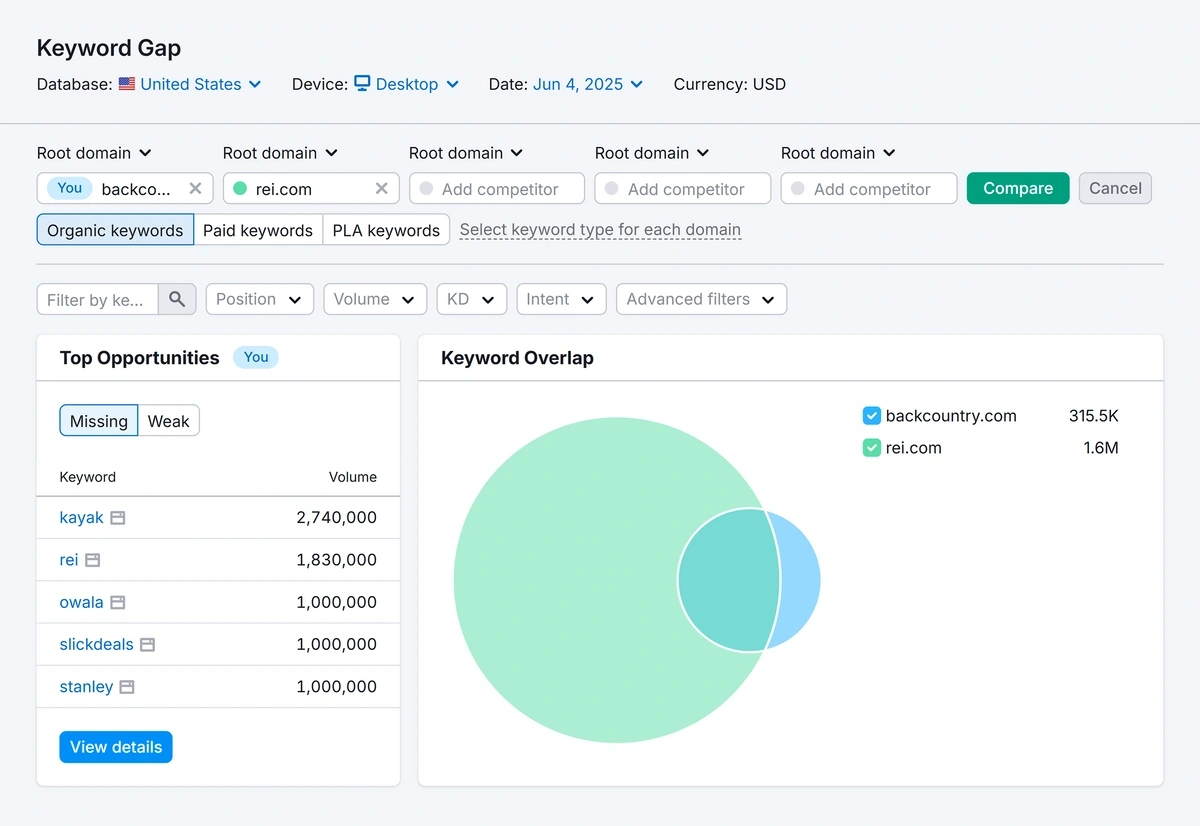
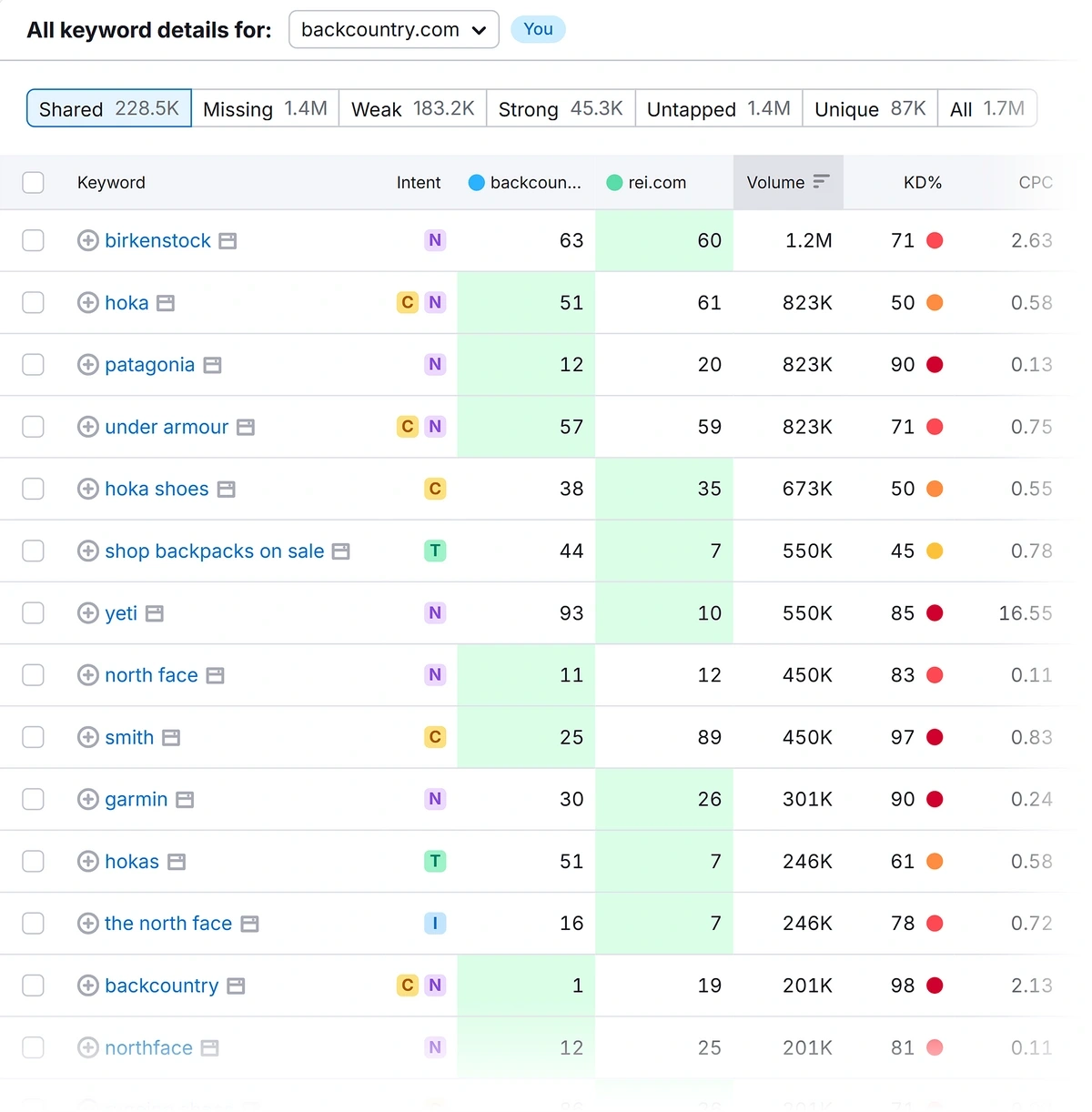
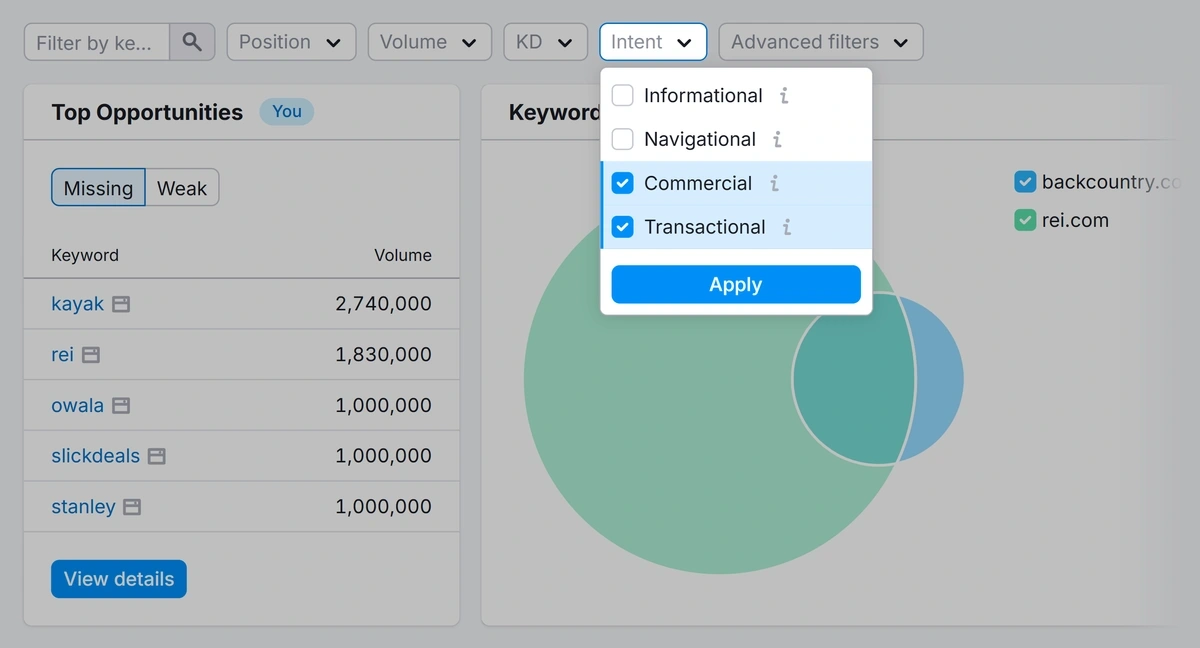
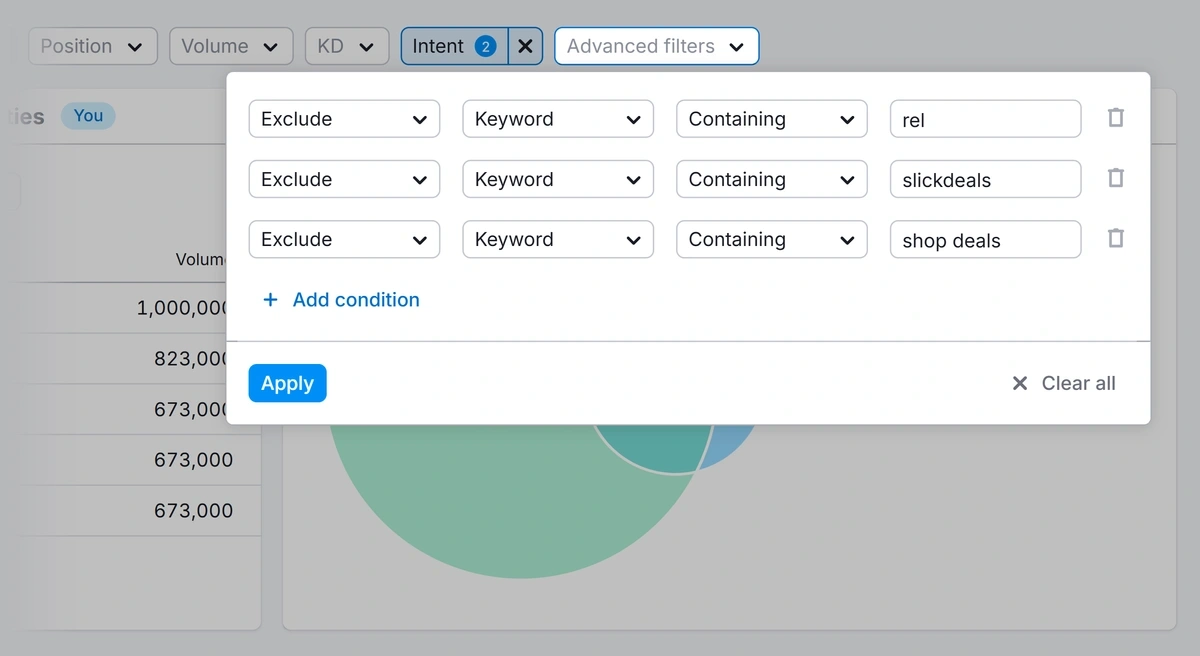
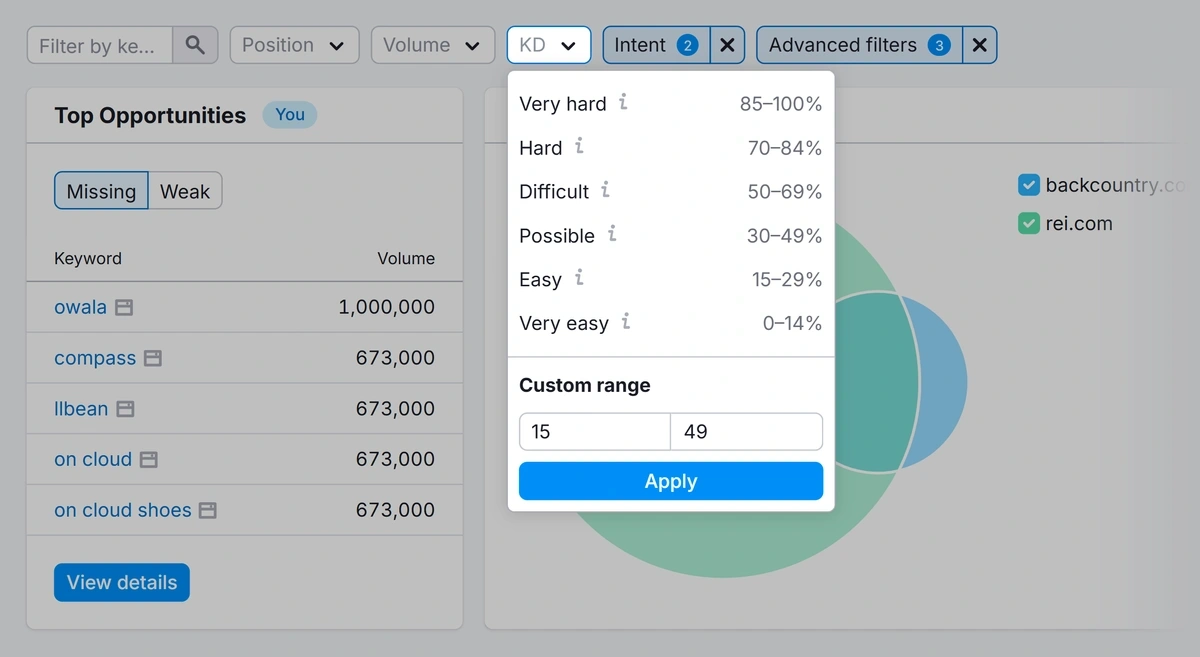
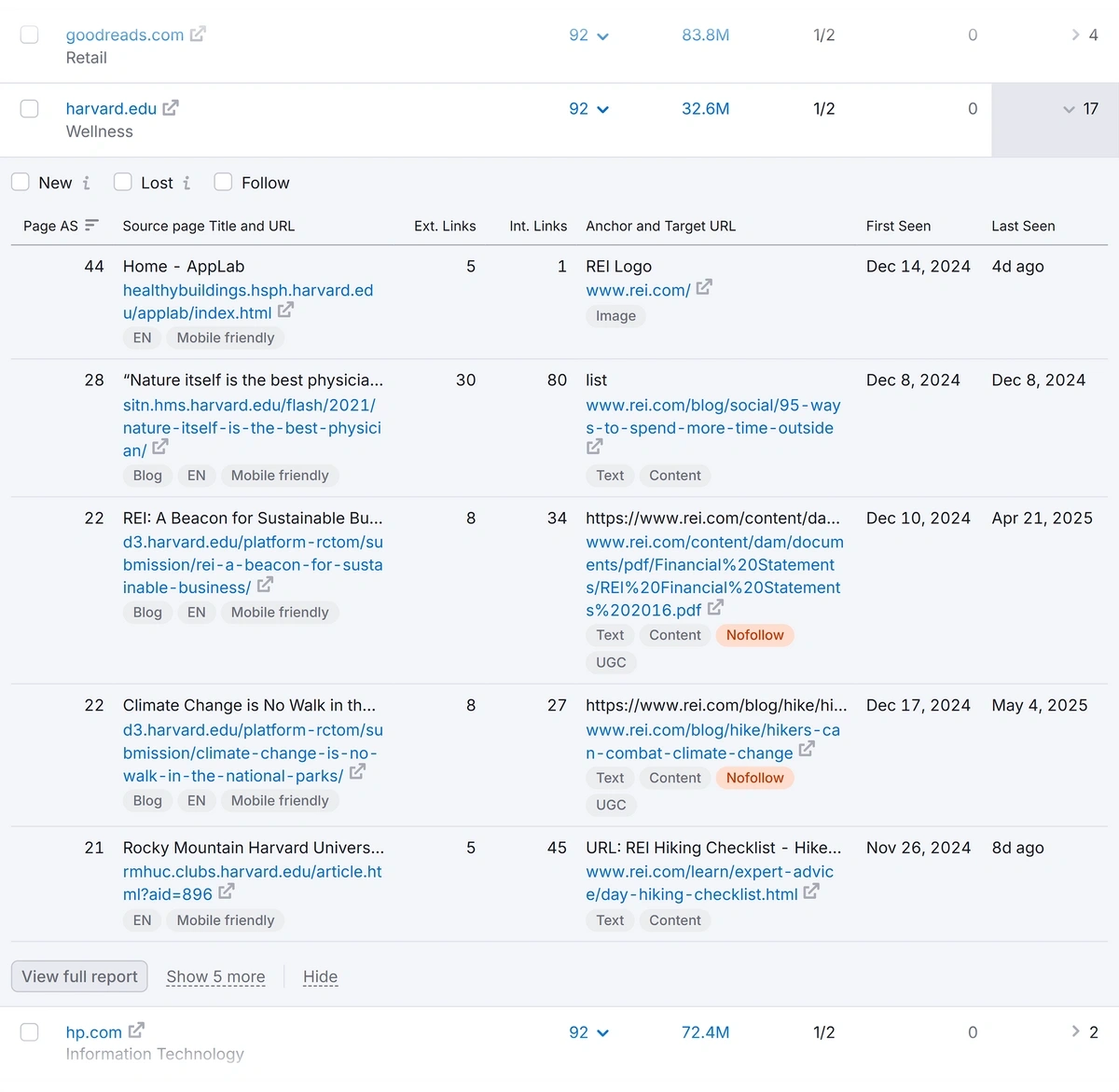
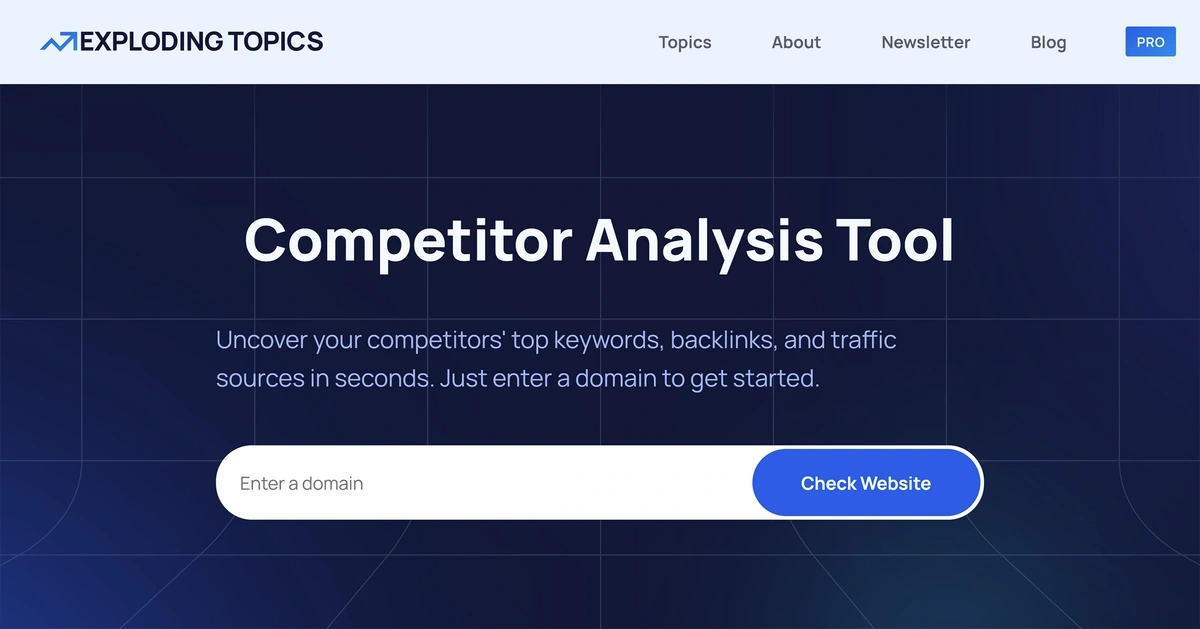

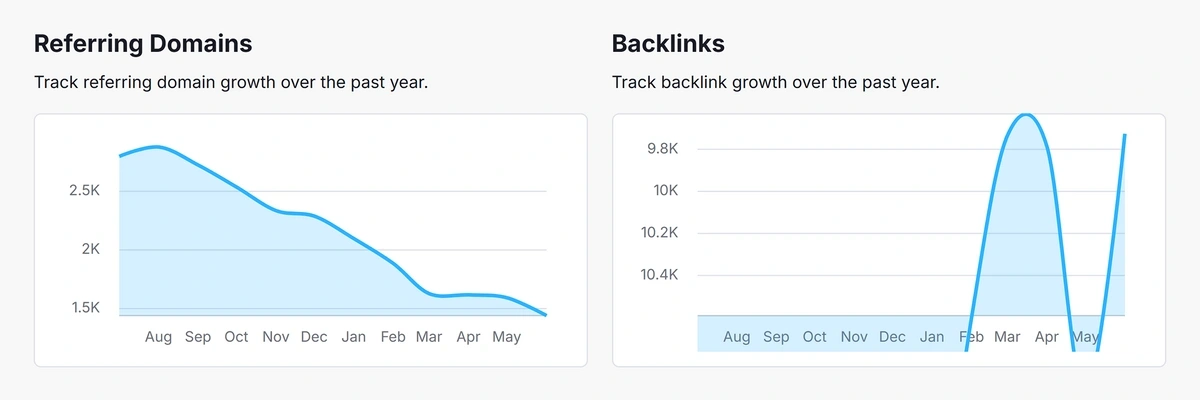
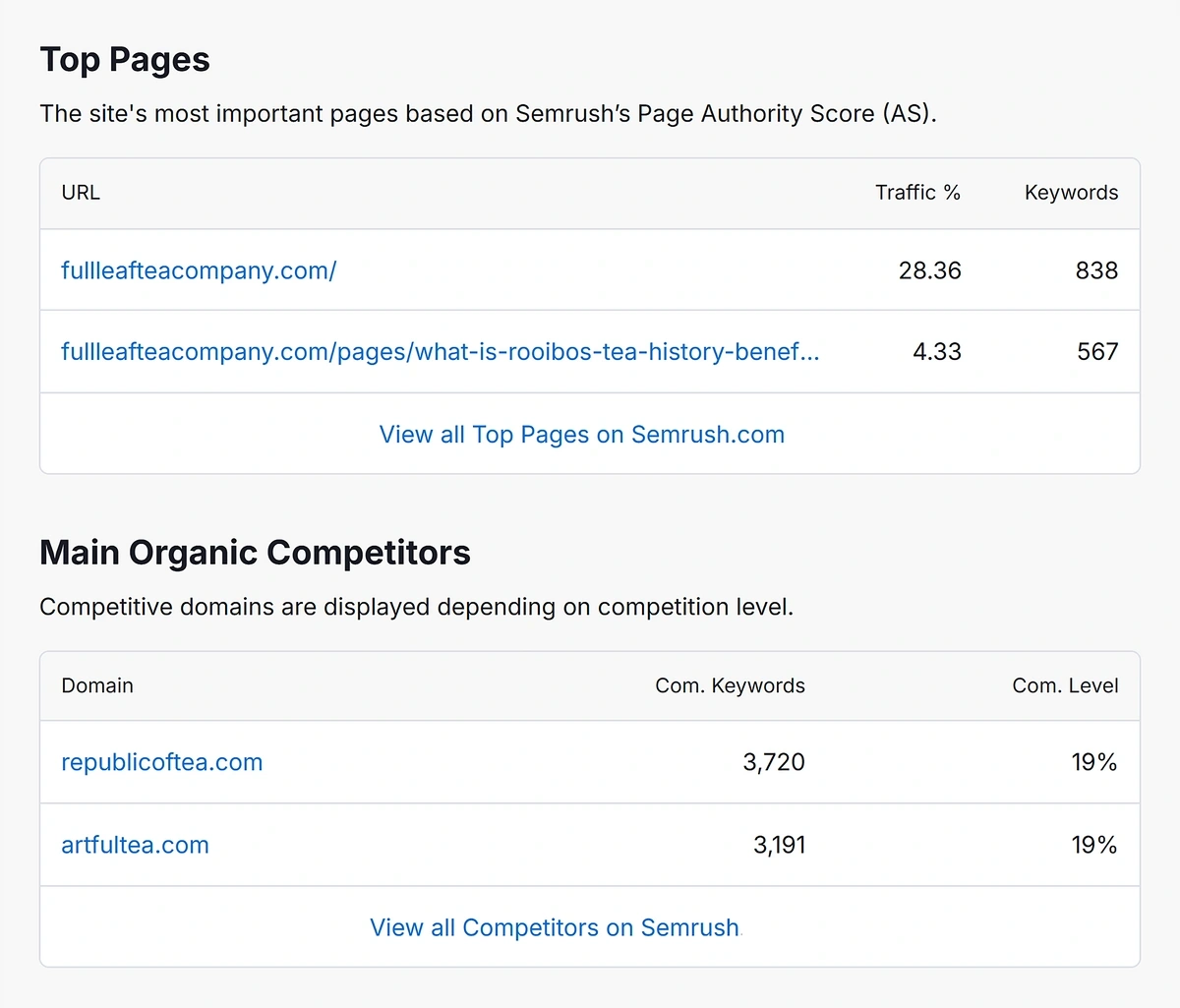
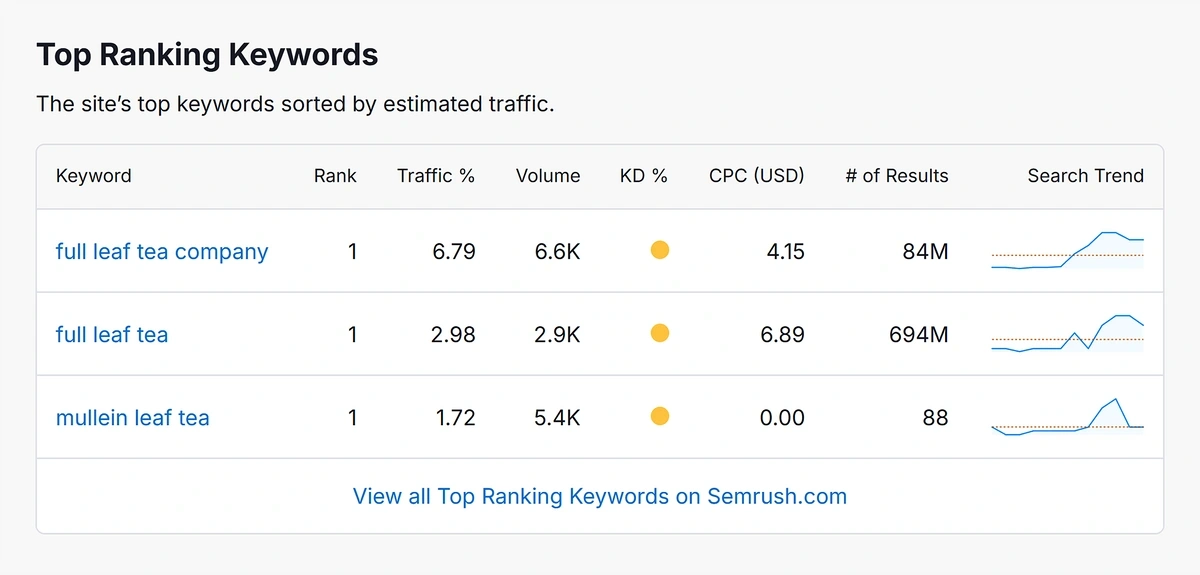
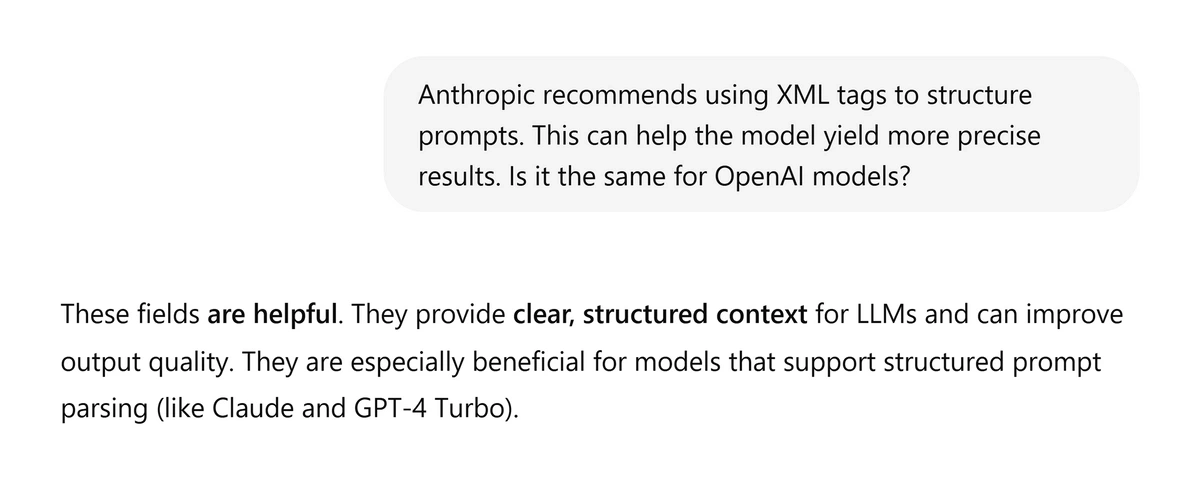
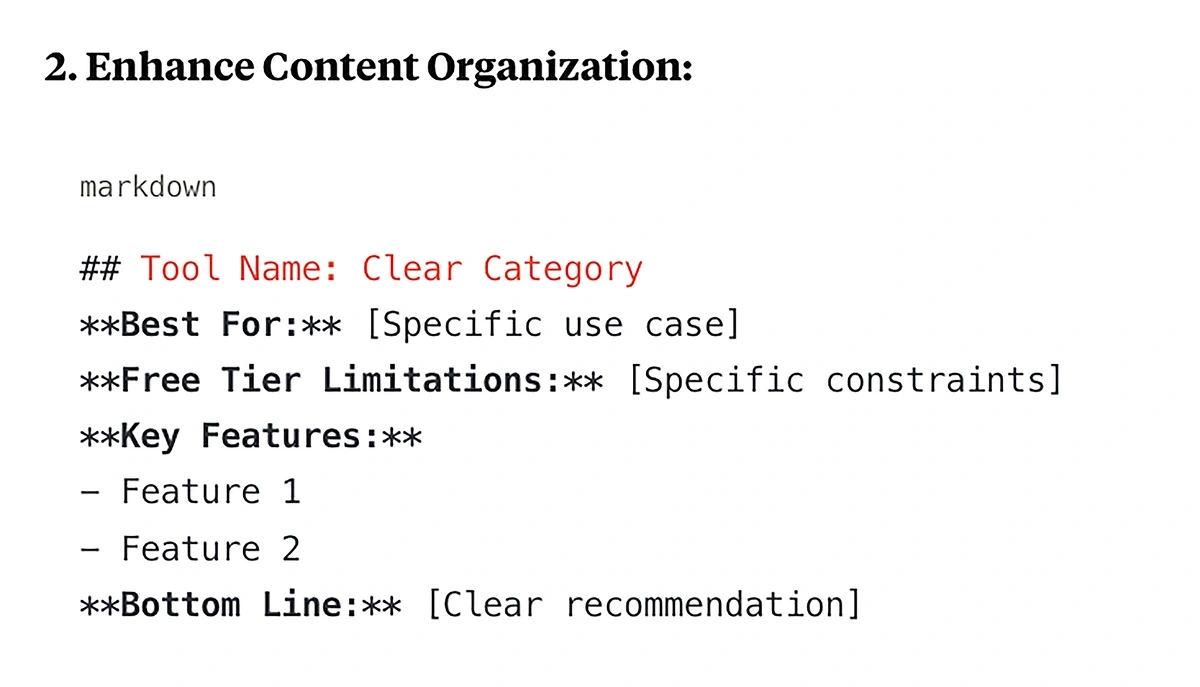
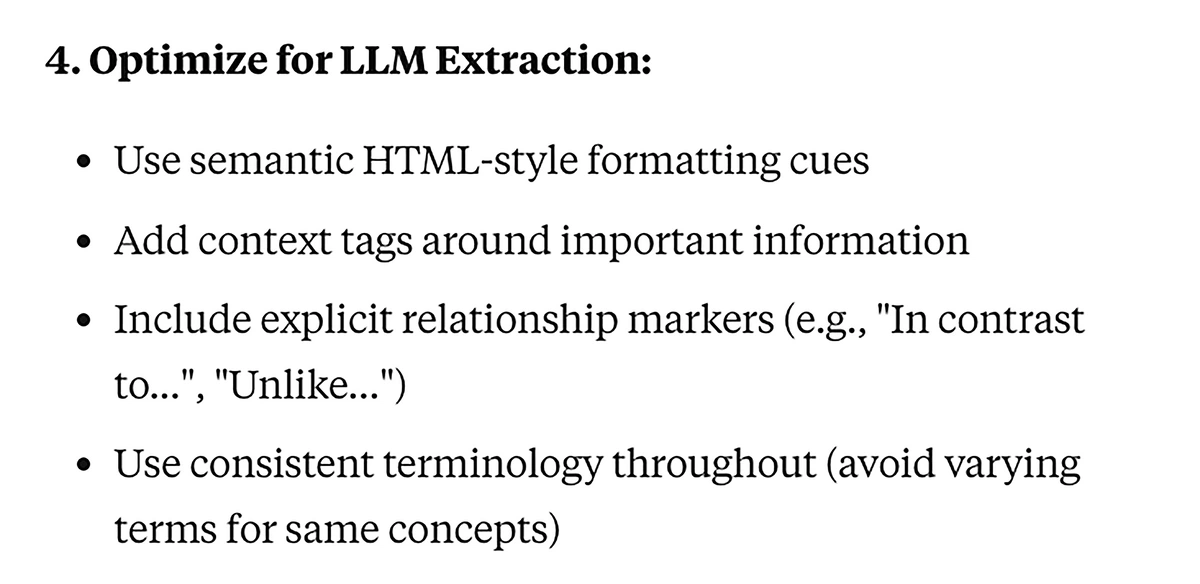
Contents:
Share:
Are there any free SEO competitor analysis tools that are useful for pro marketers?
Yes, there are a few. But definitions of “free” vary.
Free tools typically fall into three categories.
Free trials provide access to premium tools for a limited time. These are useful for testing software before purchasing. Some trials give you the complete feature set to evaluate.
Permanently free accounts are usually too limited for professional use. But there are exceptions.
Free AI models can be used to create custom SEO competitor analyses.
Here are my top recommendations, plus which free tools to skip
Summary: Semrush is a market leader in SEO competitor analysis.
You can sign up for a free account with limited data or a free trial of their Pro or Guru plan.
Best for: Professional marketers and agencies
Free tier limitations: The permanently free account tools offer 10 rows of data for analysis, while the free trials have no limitations.
My take: Opt for the free 14-day trial. You’ll get full access to all tools and features.
Let’s take a closer look.
I’ve been using Semrush for years, but it’s been a while since I used their permanently free account. To explore it, I signed up under a different email address.
These are the main competitor analysis tools you’ll get access to:
Let’s take a closer look at the Keyword Gap tool. I use this frequently for content planning. The tool enables you to find keywords your competitors are ranking for, but you aren’t.
How much can you do for free with Keyword Gap?
To find out, I added backcountry.com as my domain and compared it to rei.com.
At the top of the page, you’ll see exactly what you do with a paid account.
Below this, you’ll get rows of keywords.
The real power in this tool is in the filters. For instance, you can filter by:
I signed up for the free trial to use all the filters and access unlimited data.
Running the same Backcountry vs REI comparison, I got over 2,300 pages of results.
You can use any filters in any combination. For instance, I filtered by Commercial and Transactional keywords to return results that signal buying intent.
Then I used the Advanced filters to exclude terms brand and sales terms.
Lastly, I filtered by Keyword Difficulty, setting a custom value between Easy and Possible.
The takeaway: You can do full competitor gap analyses with the free trial.
Next, I tested the Semrush Backlink Gap tool.
With the permanently free account, I got another 10 rows of data.
Switching to the free trial, I ended up with 787 pages of backlink opportunities for Backcountry.
For instance, I see Harvard has linked to REI 17 times.
I can expand the harvard.edu row to see the exact backlinks.
Marketing professionals will definitely want access to all filters and features. So I recommend the free trial.
Here’s how to get the most out of the trial.
First, use our promo link to double your free trial from 7 days to 14 days.
When you sign up, choose between the Pro or Guru plans.
You’ll need to enter a credit or debit card number in order to get the free trial.
Once you get the free trial, you’ll have access to all their SEO competitor tools, including:
Bottom line: Semrush is arguably the global leader in comprehensive SEO competitor analysis. With a 14-day free trial, you’ll gain full access to these tools and can quickly assess their value.
Next is an option that’s permanently free with limited data.
Get a complete view of your competitors to anticipate trends and lead your market
Summary: Exploding Topics provides a permanently free competitor analysis tool.
Best for: Non-marketers who want top-line competitor metrics.
Free tier limitations: No limitation on usage. Top Pages and Competitor tiles are limited to 2 rows; Top Ranking Keywords are limited to 3. You can pull more data from Semrush with a free account.
My take: Useful for topline competitor metrics.
Enter any domain into the Exploding Topics Competitor Analysis Tool, and you’ll get a sampler of free data pulled from Semrush.
To test it, I entered the domain for Fuller Tea Leaf Company.
The results page features 4 metrics at the top:
You’ll also get 1-year trend lines for referring domains and backlinks.
The Top Pages and Main Organic Competitors tiles list 2 results, with a link to view more in Semrush.
The Top Ranking Keywords tile provides 3 results, along with Keyword Difficulty, CPC, Volume, and Traffic percentage metrics.
The tool offers a 14-day free trial of the Semrush Pro Plan, so you can access more data.
Bottom line: The Exploding Topics tool is helpful for a quick overview of competitor performance.
Summary: ChatGPT can be used effectively to augment SEO competitor analysis.
Best for: Content marketers of any experience level.
Free tier limitations: ChatGPT is free to use. However, free users can only access GPT-4o a limited (and undisclosed) number of times “within a five-hour window.” Users receive a message if they reach their limit. [Source: OpenAI Free tier FAQ]
My take: Success depends on well-crafted prompts and a willingness to experiment.
For starters, you can use AI at the pre-publication stage or to update existing content to boost its competitiveness.
Consider using ChatGPT to compare your unpublished article to one or more competitor articles that are ranking high for the target keyword.
To do this, upload a PDF of your article and at least one competitor's article. Then, craft a precise and clear prompt.
Include:
Prompt optimization: Anthropic recommends using XML tags to structure prompts. This can help the model yield more precise results. Is it the same for OpenAI models?
I asked ChatGPT for its take.
Here’s the reply:
Tip: Ask ChatGPT to review your entire prompt and make recommendations for improvement.
Prompt example:
<role>
You are a senior SEO strategist with 10+ years of experience in competitive analysis. And you’re familiar with AI-enhanced content optimization.
</role>
<context>
You’ve written an SEO article targeting the keyword ["keyword"]. Before submitting it for editing, you want to ensure it matches or exceeds the quality and depth of a top-ranking competitor article.
</context>
<instructions>
Compare "my-article.pdf" to "competitor.pdf":
1. List up to 10 subtopics the competitor article includes that are missing from my-article.pdf.
2. From those, identify up to 3 subtopics that would be highly relevant or interesting to [insert audience description, e.g., “professional marketers”].
3. Note any special page features in competitor.pdf (e.g., tables, charts, callouts, comparison grids) that are absent in my-article.pdf.
4. Compare formatting, layout, and writing style. Suggest formatting and textual improvements to enhance the LLM-readability and scannability of my-article.pdf.
</instructions>
I ran my prompt in both ChatGPT and Claude. Both returned many helpful recommendations. Here’s an example below.
You can use the fourth step above as a standalone prompt. Be sure to add your own instructions.
GEO (Generative Engine Optimization) is a nascent field, but it’s not too early to treat LLM-readability as a competitive advantage.
Here’s a small part of a recommendation I obtained for an article I analyzed with Claude Sonnet.
Look for new reasoning models released by OpenAI. These are often free upgrades, at least temporarily.
Examples are o3 and 04-mini. Both boost visual perception (useful for reading charts, diagrams) and the problem-solving accuracy of ChatGPT.
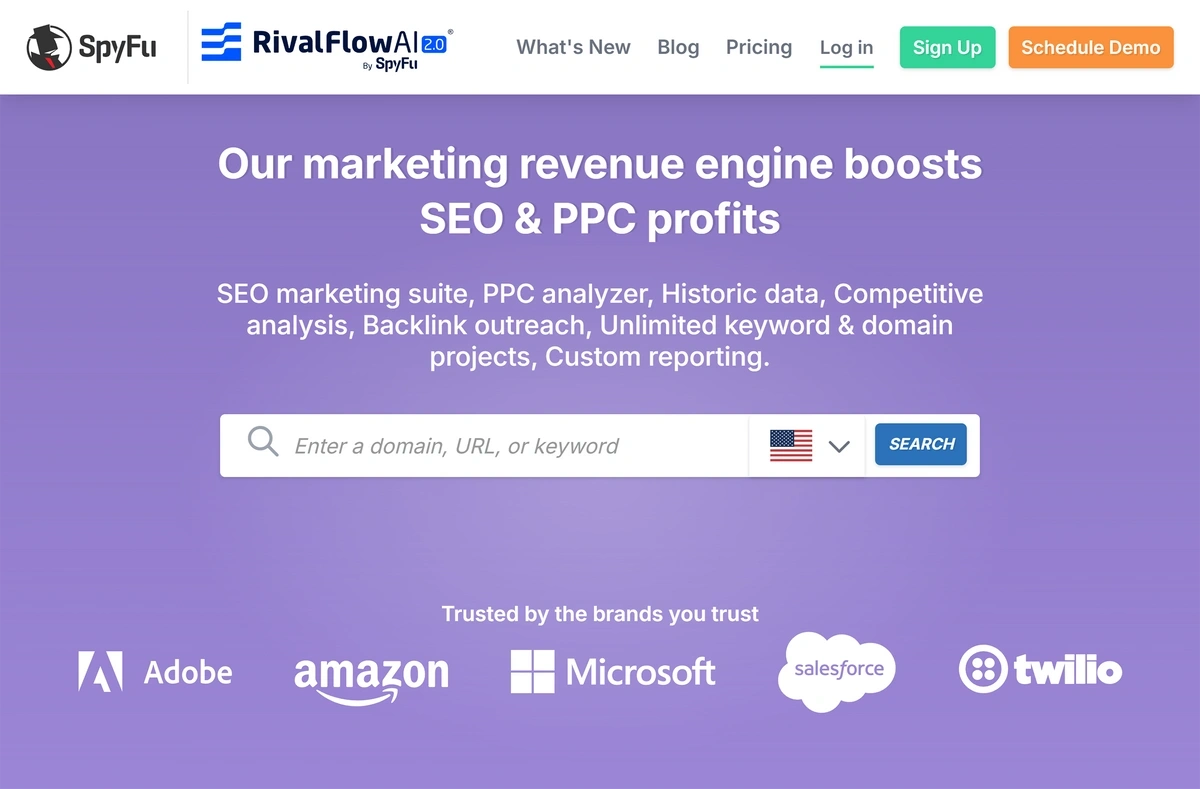
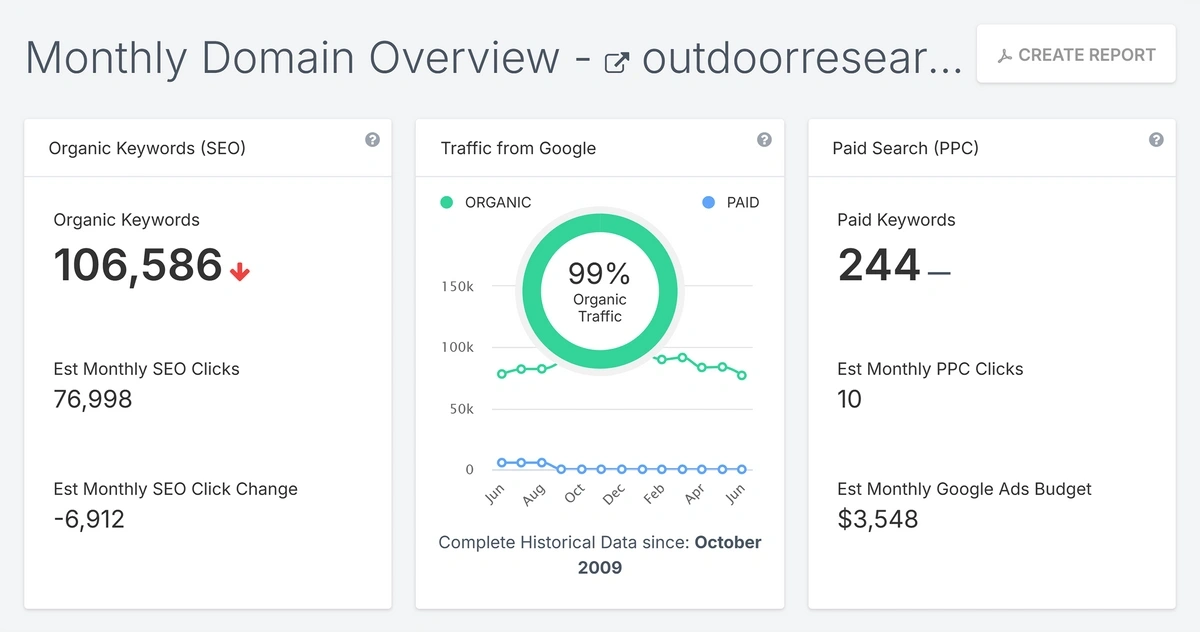
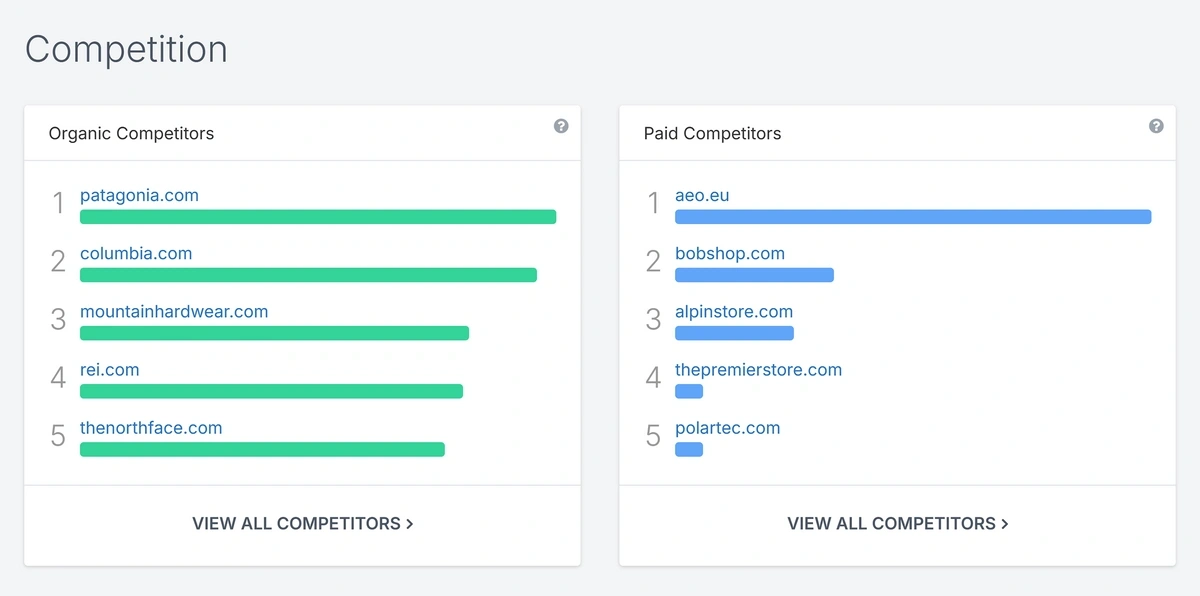

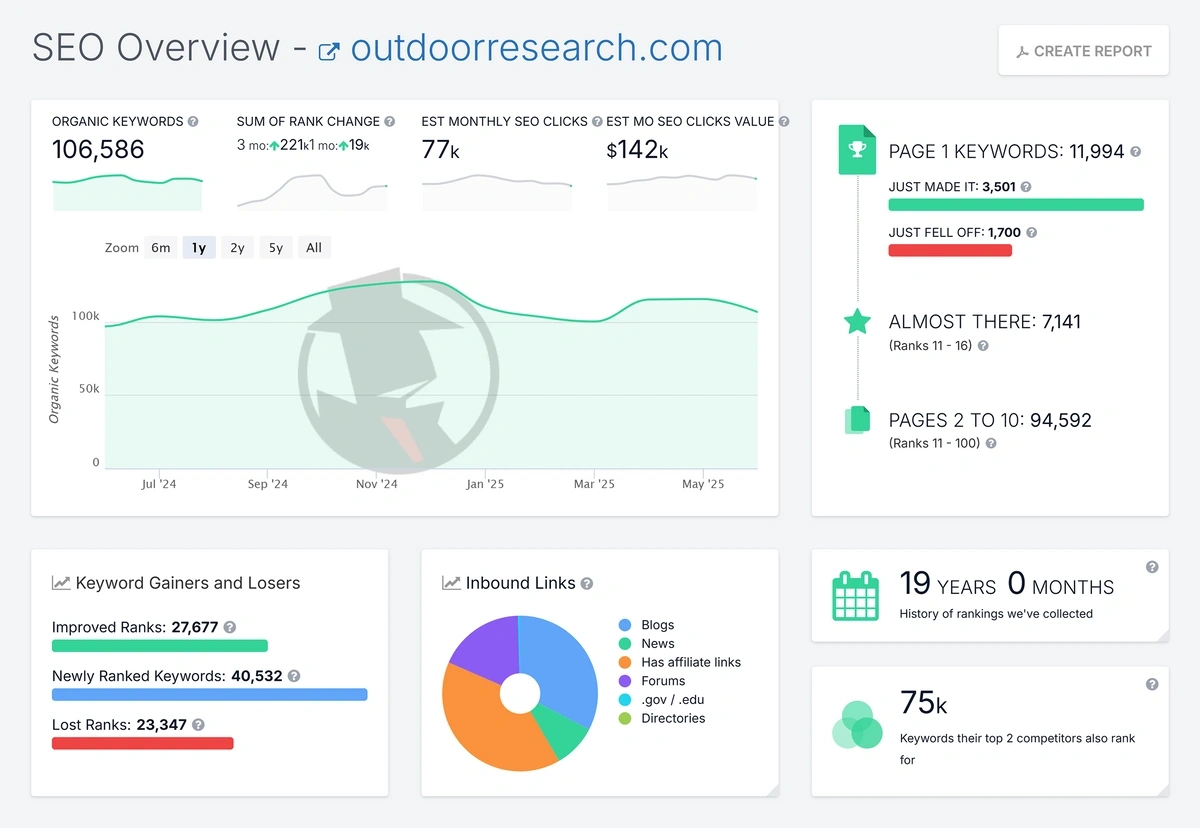
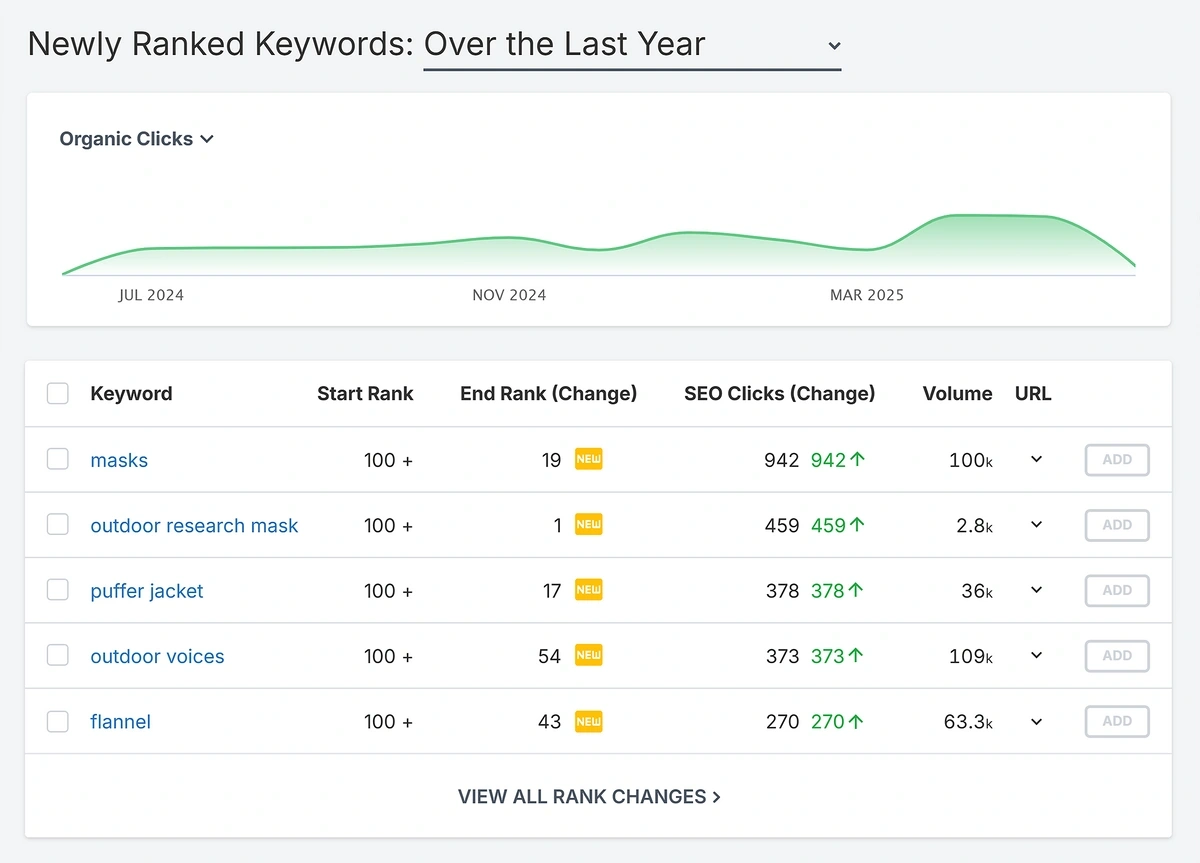
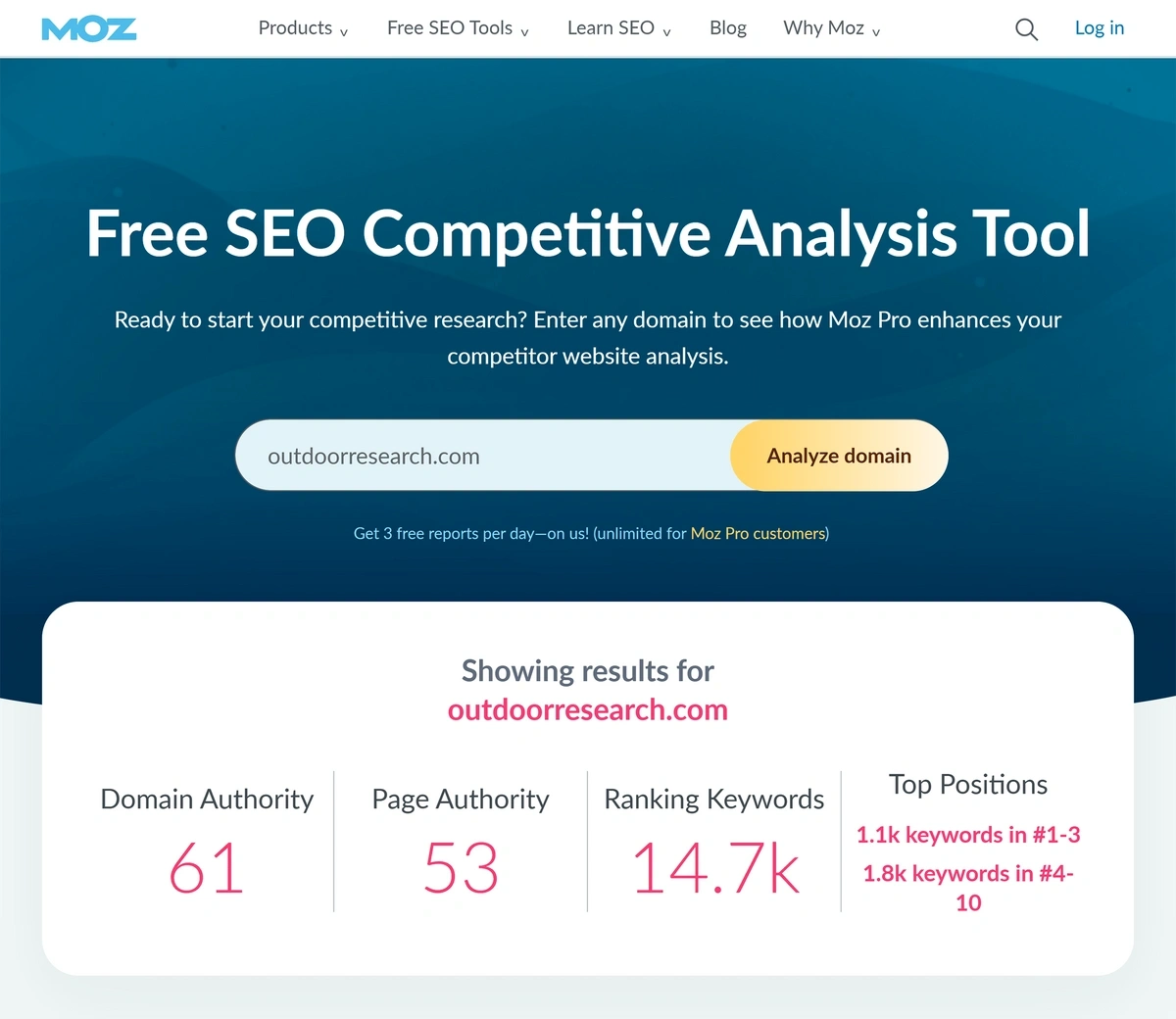
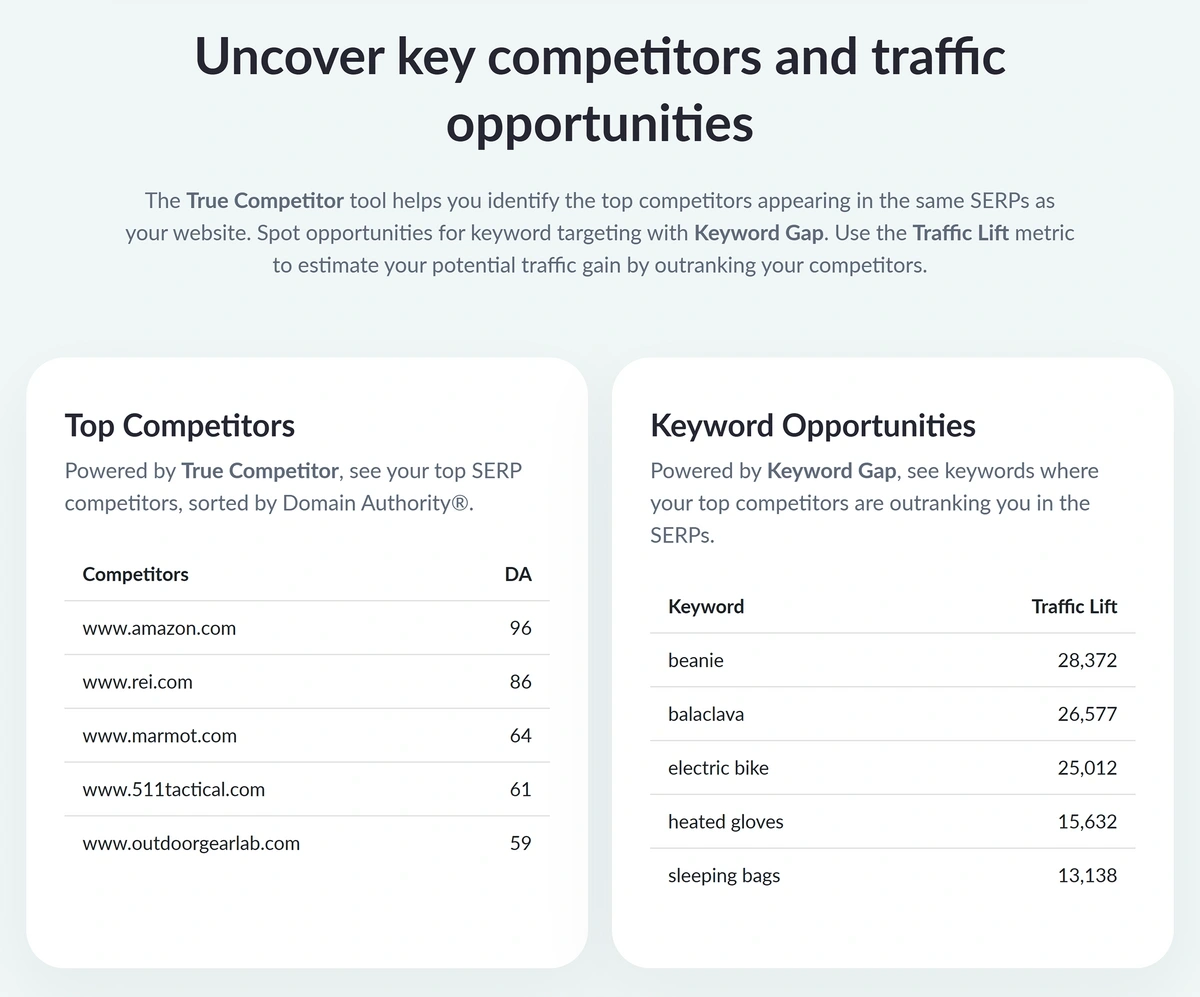
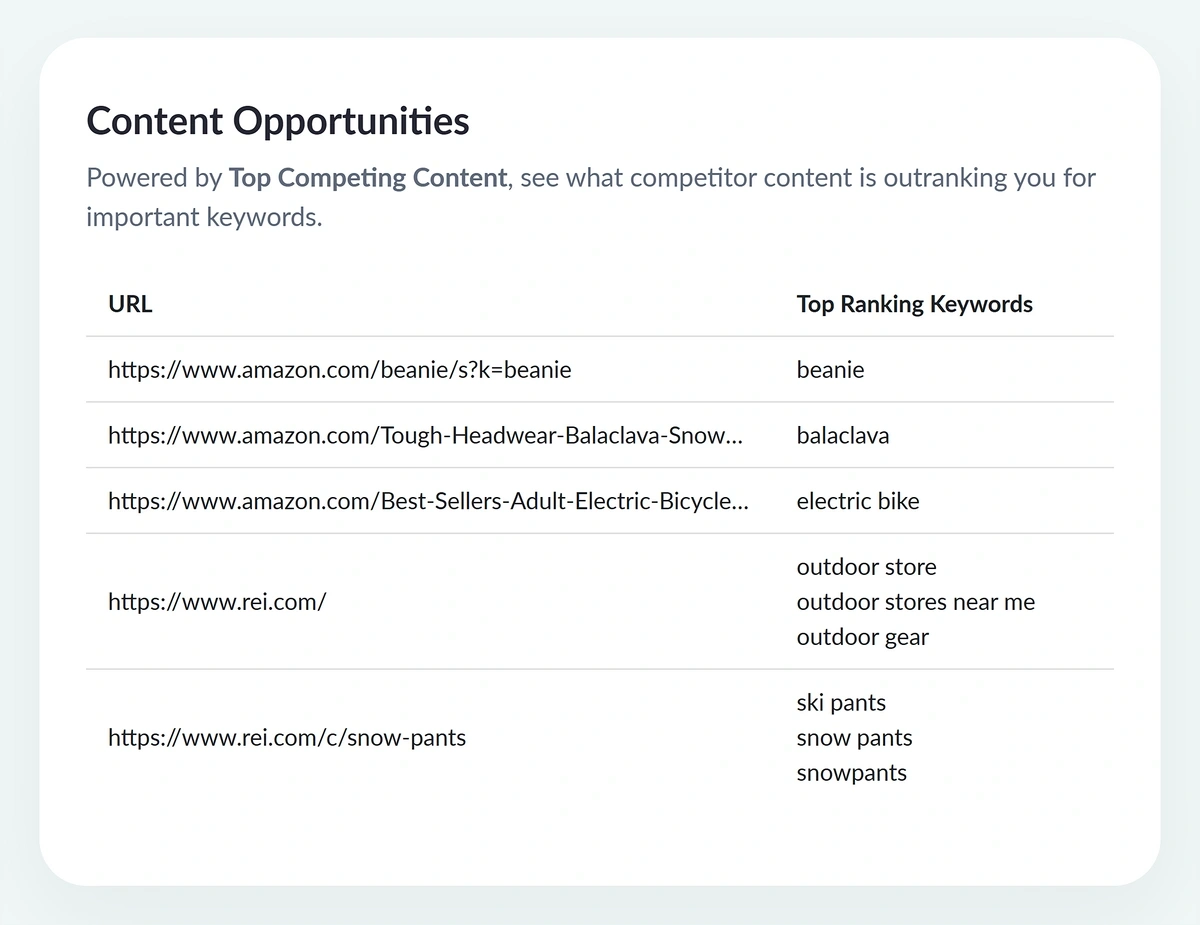

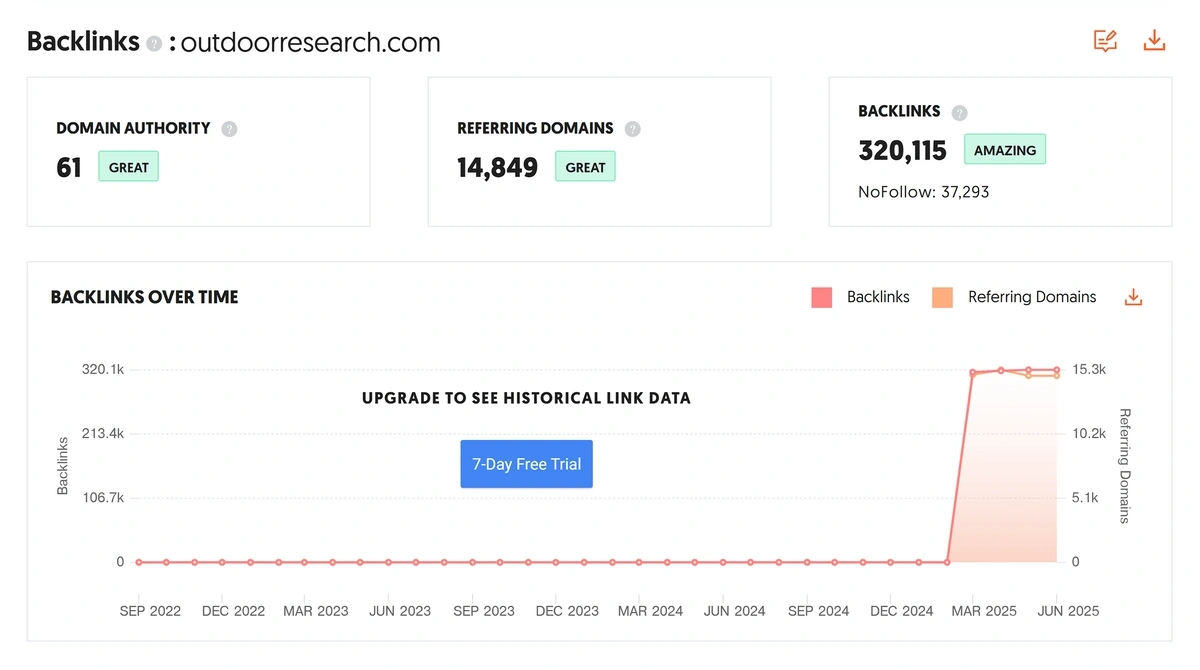

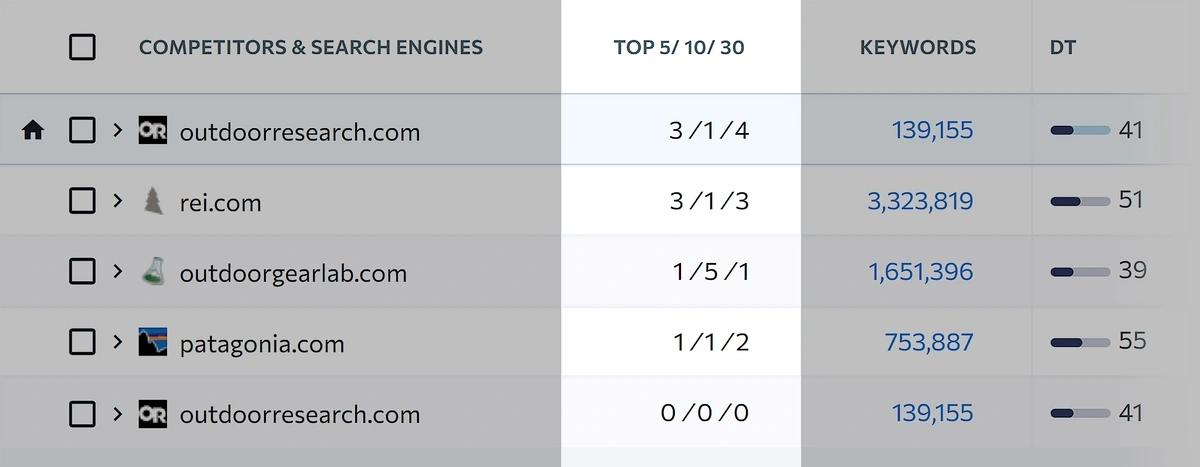
You can also try your prompt in other AI models, like DeepSeek or Claude, to see if there’s a notable difference.
Bottom line: Regardless of the model you use, running SEO competitor analysis prompts can yield surprising nuggets of value.
Explore competitors’ website traffic stats, discover growth points, and expand your market share.
Summary: Spyfu is a budget SEO tool that offers a free version via their homepage.
Best for: Small businesses without marketing staff.
Free tier limitations: The permanently free tool provides 5 rows of data per analysis.
My take: Spyfu provides a generous amount of useful competitor data for free. This will satisfy some small businesses and solopreneurs. Professionals will need a more advanced tool, like Semrush.
At the top of the Spyfu homepage, you’ll see a field to enter a domain.
This gives you limited access to all their tools, for free.
Enter a competitor’s domain into the field, and you’ll view:
You can click through some of these metrics to get more detailed data.
For instance, clicking through on the competitors takes you to a trend chart with Google algorithm update annotations.
You can tab between different time frames to display SEO keyword trends, monthly clicks, and monthly value.
Below the chart, there’s a bit more data, like monthly value of clicks.
However, with the free version, you can’t select competitors: you can only view data on those Spyfu selects for you.
You can also analyze competitor domains for their top 5 keywords, pages, or backlinks. That data can be sorted by different dimensions, such as volume, keyword difficulty, or domain authority score.
Click on the SEO Overview tab to view even more data.
The “Newly Ranked Keywords” feature includes a drop-down date picker.
Bottom line: Spyfu offers an impressive amount of free data with no time limits on usage. That said, even the paid version is too limited to satisfy marketers with advanced SEO knowledge.
Find out why I prefer Semrush over Spyfu, and see how it stands up in a three-way Ahrefs vs Spyfu vs Semrush test.
Find out who’s linking to them and build a better backlink strategy.
Summary: Moz competes with Semrush as a budget alternative. Its free tools (and paid tools) are far more limited than those available from Semrush.
Best for: Beginner marketers.
Free tier limitations: The permanently free tools are extremely limited. The free trial is available for 7 days.
My take: Skip. The tool is not useful for professionals. And I don’t recommend a free trial or the paid version of Moz.
Moz offers several free SEO tools, including one for competitive research.
Details: The free Competitive Research tool is limited to 3 reports a day.
I ran a “report” for outdoorresearch.com and got some basic numbers like Domain Authority and number of Ranking Keywords.
These numbers are not clickable.
You’ll also see a list of Top Competitors and Keyword Opportunities. The latter comes from their Keyword Gap report.
However, like Spyfu, Moz picks the competitors that appear in the free tool.
In this instance, they included Amazon. So one of the recommended keywords was “headphones,” even though Outdoor Research doesn’t sell headphones.
Likewise, the Content Opportunities were bland. Plus, there was no way to interact with the report to access further data.
Moz does offer a 7-day free trial that requires a card.
Bottom line: Moz has a legendary place in the history of SEO software, but it has not kept pace with the industry, and its tools are disappointing.
Summary: Ubersuggest, which positions itself as a budget competitor to Ahrefs and Semrush, provides a free version and a 7-day free trial. It's one of the smaller options on this list: Ubersuggest gets around 11,500 monthly visits.
Best for: Budget-conscious solopreneurs and micro businesses.
Free tier limitations: The permanently free version can only be used to analyze 1 website.
My take: Because the free account is limited to analysis of 1 website, it’s not useful for SEO competitor analysis.
Rank tracking: The free version of Ubersuggest only gave me historical data for the day I used it: June 5th. So there was nothing useful here.
Tracked keywords: You can track up to 25 keywords. But again, no historical data is available.
Backlinks: You’ll get basic metrics like domain authority, total number of referring domains. But you’ll see a prompt to upgrade to the 7-day free trial to get historical data.
When you click the 7-day free trial button, you’ll be offered the Individual plan for $29/month. However, that only allows you to analyze 5 competitors.
By comparison, the free trial or paid versions of Semrush do not limit the number of competitor domains analyzed.
Also, keyword gap analysis in Semrush is far more versatile than what Ubersuggest offers.
The bottom line: UberSuggest's free version isn’t useful for SEO competitor analysis. And Semrush outperforms Ubersuggest’s paid version.
That said, if you’re interested in Ubersuggest, I recommend taking free trials of this software and Semrush and comparing them.
Summary: SE Ranking competes with Semrush and Ahrefs. A free account is not available, but you can access a free trial.
Best for: Mid-level marketers.
Free tier limitations: The free trial lasts 14 days, and competitor data is limited to 6 months of history.
My take: The competitor data is slow to appear. Semrush is more advanced. Try both and decide for yourself.
SE Ranking does not have a permanently free version, even though some articles suggest it does
However, you can get a 14-day free trial; no card required.
SE Ranking has a My Competitors section, where you can add your domain and several competitors.
I used outdoorresearch.com as my main domain and selected 3 top competitors.
Minor quibble: the competitor data took a few hours to load.
Tabbed charts include:
Each tab displays trend line charts with an excellent UI and crosshair tooltips.
Here’s a close-up of the Search Visibility tab.
Below the available trendline charts, you’ll find sortable tables.
The close-up below shows how many keywords each competitor has in the top 5/10/30 positions of Google SERP.
Given these are big brands, the numbers look inordinately small.
A quick check of Semrush reveals Outdoor Research has 4,773 keywords in the top 5 of Google.
The low numbers in the SE Ranking free trial must be tied to a free trial limit imposed on the total number of keywords analyzed.
The limitations present in the AI tool support that.
For SE Ranking’s new AI SERP competitors, the free trial limits you to 20 keywords (which you manually add) and 1 search engine.
I recommend the free trial to Semrush as a stepping stone to a paid subscription.
Budget-conscious marketers may want to compare the Semrush free trial with SE Ranking’s.
Experiment with the ChatGPT prompt provided in this article. Customize it to suit your needs.
Ready to augment your competitive strategy?
Choose one of the top free SEO competitor analysis tools covered here and start amplifying your results.
Use real-time topic data to create content that resonates and brings results.
Exploding Topics is owned by Semrush. Our mission is to provide accurate data and expert insights on emerging trends. Unless otherwise noted, this page’s content was written by either an employee or a paid contractor of Semrush Inc.
Use real-time topic data to create content that resonates and brings results.
Share
Newsletter Signup
By clicking “Subscribe” you agree to Semrush Privacy Policy and consent to Semrush using your contact data for newsletter purposes
Written By
Sherrie Gossett
Small Business Consultant
Sherrie Gossett has a knack for uncovering hidden trends and opportunities that others overlook, drawing on her extensive experien… Read more
Research shows that the value of LLM search traffic could overtake Google by 2028. Find out what this means, how to prepare, and more in this report.
Screaming Frog and Semrush are two widely recommended SEO tools—but which one is best? See how the two platforms stack up, and learn how to get an extended Semrush trial.
Use these proven strategies to improve your website SEO for higher visibility in traditional Google search and AI-driven results.
Compare Google Keyword Planner vs Ahrefs with our detailed analysis. Learn key features, pricing, and limitations to choose the best keyword research tool.
Follow this step-by-step guide to conduct an expert-level SEO audit, improve your site's performance in search results, and get your content cited by ChatGPT.
source
Types of Digital Marketing: The Marketer’s Toolkit for 2025 – Simplilearn.com
/in website SEO, Website Traffic/by Team ZYTTypes of Digital Marketing: The Marketer’s Toolkit for 2025 Simplilearn.com
source
Coca-Cola Marketing Strategy: A Case Study – Simplilearn.com
/in website SEO, Website Traffic/by Team ZYTCoca-Cola Marketing Strategy: A Case Study Simplilearn.com
source
The Best CMS for SEO: 2025 Guide – RebelMouse
/in website SEO, Website Traffic/by Team ZYTDiscover the 10 best CMS platforms for SEO in 2025!
 RebelMouse CMS
RebelMouse CMS
 RebelMouse CMS
RebelMouse CMS
 RebelMouse CMS
RebelMouse CMS
 RebelMouse CMS
RebelMouse CMS
 WordPress CMS
WordPress CMS
 WordPress CMS
WordPress CMS
 Drupal CMS
Drupal CMS

 Magento CMS
Magento CMS
 HubSpot CMS
HubSpot CMS
 Computan
Computan
 Adobe Experience Manager CMS
Adobe Experience Manager CMS
 Wix CMS
Wix CMS
 Squarespace CMS
Squarespace CMS
 Joomla CMS
Joomla CMS

Investing in the best content management system (CMS) for SEO is crucial to increasing your website’s ranking and visibility online. Not all CMS platforms are built alike. Specific ones cater to e-commerce, corporate websites, blogging, various forms of media, and more. Content management systems have transformed the digital landscape to be more user-friendly and simple to navigate for even the least tech-savvy individual.
Some platforms allow you to build a website and manage your content within minutes, while others require a development team to get you up and running. No matter what CMS platform you choose, selecting the best one that caters to SEO is essential. According to industry research, SEO drives more organic traffic than social media. A proper CMS and smart SEO play a significant role in digital marketing and website management.
Diving into the world of content management systems and SEO might seem overwhelming, but worry not. This blog post will list the 10 best CMS platforms for SEO, and we'll follow that up with why a CMS matters for SEO, what makes a CMS SEO-friendly, and the essential CMS features for SEO improvement. With not much further ado, here are our choices for the top 10.
When choosing the right CMS platform for SEO, the consensus is that a CMS should offer customization, built-in SEO tools, analytics, and simple navigation for technical and non-tech-savvy users. Let's dive into the 10 best CMS platforms for SEO in 2025.
RebelMouse is one of the most intuitive CMS platforms for publishers. Known as a next-generation, enterprise-grade publishing platform, RebelMouse is a next-generation AI-enabled CMS that is an ideal choice for publishers looking to maximize their SEO strategies with integrative AI features, analytics, auto-updating sitemaps, and linking structures to help rank your content quickly.
RebelMouse is known for its SEO technology centered around the best practices for search, including detailed metadata that helps Google's site crawler identify, index, and bring traffic to your site. It often leads clients to experience traffic surges due to the easy-to-use interface that maximizes ranking potential from the user-friendly SEO extensions. These CMS qualities are just some of the reasons why RebelMouse is the best CMS for SEO.
RebelMouse's Entry Editor features an SEO section designed to help you optimize every post to give it the best shot at winning a targeted search phrase. Here's a glimpse into how it guides writers and editors through a perfected search strategy before clicking the "Publish" button.
It can be tricky to nail down which search phrase you want to win. Within the SEO tab, the drop-down list suggests search phrases that are already performing well across Google Search, including each keyword’s monthly search volume. This helps you determine which phrases are easy to win, or perhaps too competitive to strategize for, on an article-by-article basis. Click here to read more about this feature.
Before You Publish:
Optimize Your URL Slug
Optimize your URL slug to match your exact search phrase.
Craft Your Title Tag and Meta Description
Determine your metadata with content recommendations and a character limit counter.
Pick Recirculation Links
Select relevant links from your own site and around the web which leads to amazing traffic boosts.
RebelMouse has many integral features to keep your Core Web Vitals, cybersecurity, and content performing at their peak functionality.
WordPress offers multiple SEO plugins and tools as one of the most popular CMS platforms. It also provides a user-friendly interface and robust security features, ensuring your website is optimized for search engines. WordPress powers at least 43% of all websites worldwide, making it a popular platform. WordPress is also known as one of the best platforms for SEO due to its numerous customization elements, built-in features for creating URLs, alt texts, and SEO add-ons like Yoast SEO.
WordPress offers a page builder known as Elementor that has gained popularity by providing a user-friendly interface, a code-free platform for non-technical users, numerous pre-designed template themes, seamless compatibility across desktop and mobile, performance optimizations, and third-party integrations.
WordPress is well known for its SEO-friendly features and functionality, such as plugins. Both the premium and free versions of WordPress include the Yoast SEO plugin, which assesses the quality of your search phrase, metadata length, alt text images, keywords, and other factors. Many users believe WordPress is one of the best content management systems for SEO due to its popular and simple interface.
Drupal offers advanced SEO features, including customizable URLs and schema markup support. It provides a responsive design and robust security features, making it a top CMS choice for SEO. The key factors that make Drupal so appealing are flexibility and customization, the ability to handle large quantities of content and data, premium security protection, a free, open-source CMS that can handle minor or complex website themes, and integrative capabilities with e-commerce platforms and CRM software.
What makes Drupal a good CMS for SEO is a codebase that makes creating well-structured data easier for search engines to crawl and index content. Like WordPress, Drupal offers SEO plugins like Yoast SEO and other tools for optimizing on-page SEO elements. The taxonomy system allows website owners to organize and categorize content effectively, helping search engines understand content relationships. Although Drupal is an SEO-friendly website builder, it can have a complicated setup process requiring a skilled professional or team.
Magento is a popular CMS for e-commerce businesses, web developers, retailers, and enterprise companies. These professionals choose Magento for their e-commerce needs due to its customization and scaling capabilities. Magento offers many SEO benefits for customizing URLs and metadata to provide more control to users looking to optimize their content. Magento supports structured data and auto-generating XML sitemaps, making it easier for search engines to discover pages efficiently and index them.
Magento is a powerful and highly specialized CMS designed for e-commerce websites. Businesses that want advanced customization, scalability, and SEO skills for their online stores choose it. Its extensive feature set, large community base, and focus on speed optimization make it an excellent choice for SEO-focused e-commerce businesses of all sizes.
HubSpot CMS Hub is built for marketers, developers, content creators, enterprises, and more. This CMS offers a secure and seamless experience for marketing system integrations and responsive web designs built for compatibility with mobile and desktop devices. HubSpot CMS Hub provides a simple-to-use interface for quick navigation, a drag-and-drop editor to manage and edit content easily, and customizable pages and themes. This CMS is ideal for the everyday blogger or a corporate company aiming to expand its tools and streamline its marketing efforts.
HubSpot CMS Hub equips its users with SEO tools that make developing an effective search strategy easy. These tools offer recommendations for user traffic insights, provide reports on user trends and searches, and show you how your content stacks against competitors in the SERPs.
Contentful is a headless CMS with an application programming interface (API), meaning it can communicate with other types of computer software and deliver content to multiple platforms and devices. Contentful offers marketers, developers, and creators a flexible and efficient way to manage content like text, videos, and images while integrating with multiple third-party tools and front-end systems. The types of users who benefit most from using Contentful include digital agencies, e-commerce businesses, and large corporations.
Contentful offers multiple content management features, making it an advantageous tool for SEO, such as structured content, tracking content changes and version control, high-speed content delivery, integration with third-party SEO tools, analytics, and optimizing URL slugs.
Adobe Experience Manager (AEM) is an enterprise-grade CMS that delivers a personalized and robust content management experience. AEM combines content creation, marketing campaigns, and digital asset management under one platform through its multifaceted CMS features. AEM offers multi-site management, content creation tools for efficiently structuring text, and website performance tools.
AEM provides many useful SEO tools and features like Google Search Console verification, auto-fill metadata, and tags, which is helpful for content-heavy sites, and website performance metrics like Adobe Analytics to optimize and accurately structure content across multiple websites, making it an ideal CMS platform for SEO management.
Wix is a user-friendly and feature-rich CMS that appeals to various users due to its beautiful website themes and simple-to-manage website functionality. Its built-in SEO capabilities, mobile responsiveness, and user-friendly interface make it an excellent alternative for anyone looking for a CMS that supports successful SEO strategies without needing professional coding or technical knowledge.
Wix is considered an SEO-friendly CMS due to its performance features, such as automatic image optimization and its CDN integration, improving site speed, a critical factor in SEO rankings. Wix offers meta tag customization, has a mobile-responsive design to increase SEO rankings on mobile devices, and features an SEO tool known as the Wix SEO Wiz. Wix SEO Wiz guides users through the SEO optimization process to help new users better understand SEO best practices.
Squarespace is an all-in-one website builder and CMS designed to empower individuals, creative professionals, small businesses, and even larger organizations to create beautiful, functional websites easily. Squarespace is a user-friendly CMS that appeals to creative professionals, small businesses, and content creators looking for a visually appealing and SEO-friendly platform to build and manage their websites.
The platform's trendy templates, integrated hosting, and built-in SEO tools make it an excellent choice for users seeking a simple CMS for SEO optimization. Squarespace is one of the best platforms for SEO due to its SEO-friendly templates equipped with clean HTML code and automated mobile compatibility, hosting solutions that improve user experience, and integrated analytics for tracking user behavior and making data-driven SEO decisions.
Joomla is a next-level CMS built for e-commerce, news publications, and large enterprises. Like WordPress, Joomla offers customizable templates for your website and includes various CMS tools that surpass many of its competitors.
If you own a media publication or e-commerce business and are looking to optimize your SEO strategy, Joomla is an ideal CMS to try. Users can modify their keywords, title tags, and URLs extension-free through Joomla's interface. Joomla contains many SEO tools to maximize link building, indexing, structured data for snippet features, and redirecting broken pages.
CMS stands for content management system. It’s a software that allows you to develop, edit, and publish content, often without any technical expertise. The best content management systems for SEO will have a user-friendly interface, making modifying and uploading content easy. SEO stands for search engine optimization.
SEO is the practice of implementing keywords and phrases that people search for into your content to deliver the most relevant and accurate response to a user's question. A good SEO strategy brings more traffic to your website and brand, and highlights you as a trustworthy and credible figure in your industry, which Google and other search engines reward by placing you at the top of the search engine results page (SERP).
As a business owner, publisher, or digital marketer, you must utilize both effectively to ensure your website's success. A CMS makes managing your website's content easier, while an SEO strategy makes that content visible to your target audience.
A CMS is the foundation of your website. It will allow you to implement, modify, and edit posts, including keywords, title tags, images and meta descriptions, update pages, offer data analytics, and find and resolve technical SEO issues. A CMS matters for SEO because it affects how search engines find and rank your content online. A good CMS should make it easy to implement SEO strategies, optimize keywords, and create structured content for search engines to scan, crawl, and index your website. These measures will increase your chances of ranking number one for a specific search phrase.
Without these CMS features, your SEO efforts will fall short and affect your ability to organize. Moreover, a CMS also impacts user experience, a crucial factor in SEO. A CMS that offers a smooth and enjoyable user experience will result in higher engagement and retention, improving your website's SEO performance. In short, the best CMS for SEO makes it easy for search engines and users to navigate your website.
Now that you understand the concept of a CMS better, it's time to dive into some essential CMS features for SEO. You need more than just being able to modify keywords and content. Your CMS should come packed with tools that make optimizing content and fixing technical SEO concerns easier. These tools should help with keyword research, provide SEO suggestions and data analytics, and guide you through improving your online visibility and marketing performance.
The following are some ideal characteristics your CMS platform should have to meet your SEO demands:
On-page SEO is creating content that will help you rank higher. On-page SEO includes:
A good CMS will allow you to optimize these to help search engines like Google determine the intent of your topic. Title tags and meta descriptions have character limits to show search engines and users what the content will be about instantly. A decent CMS will alert you if you exceed a specific character limit and will provide ways to improve your text for increased exposure and traffic.
An ideal CMS will offer layout and design tool features that allow customization to easily change elements like color scheme, text, and font size to differentiate your brand from competitors. Additional CMS features include implementing videos, images, alt text, links, and structured content, as well as the ability to easily personalize titles, headers, URL slugs, and meta descriptions.
The URL slug is among the first places search engines crawl to determine page context. Lengthy or confusing URLs don't help the user experience and lead to poor page performance. Your CMS should help you customize your slug to be SEO-optimized. Keep your URLs short and only include your target keyword or search phrase.
When crawling pages, search engines look for structured data to offer readers relevant and thorough information. Structured data presents content in the most aesthetically appealing and scannable manner, contributing to featured snippets appearing at the top of organic search results. Marketers should search for a platform with data structure tools such as embed codes for links and videos, drag-and-drop editors, call-to-action buttons, table of contents, and more.
Core Web Vitals measure aspects of web performance that directly impact user experience, including page load speed, interactivity, and visual layouts. A CMS that prioritizes these metrics ensures that the website and published content deliver a fast and smooth browsing experience, which is crucial for retaining and engaging users. Google has stated that Core Web Vitals are a ranking factor for its algorithm. The best SEO CMS helps websites achieve better Core Web Vitals scores, contributing to higher search engine rankings and increased organic traffic for businesses and individuals.
SEO is more in depth than simply implementing keywords. Technical SEO involves improving the technical components of a website to improve rankings and overall site performance. A website with poor technical SEO may suffer from slow page speed, low online visibility, broken pages and links, and poor site quality that may leave users unengaged and frustrated. A CMS platform should offer tools that report or allow you to fix technical issues such as toxic links quickly. The most important aspects of technical SEO include:
With artificial intelligence (AI) on the rise, it's crucial for a CMS platform to offer AI integrations that allow seamless content generation, automation, and optimization. More CMS platforms are updating their interface to offer AI features to enhance content development and bring more value to users.
Some CMS platforms provide elementary SEO features, but the real magic lies in advanced SEO tools like plugins and extensions. A proper CMS should offer SEO extensions like keyword search phrase suggestions, analytics and search volume for a particular keyword, linking automation, and schema markup updates. A CMS that provides no SEO tools leaves users at a disadvantage against their competitors.
When something goes wrong with your CMS, such as an uptime problem, it's critical to have access to customer assistance. CMS solutions that provide 24/7 support or quick responses to user inquiries improve the user experience, increasing user retention and loyalty.
Creating and implementing a good SEO strategy takes time. To ensure that your website is on track, a good CMS should track performance indicators such as top keywords, indexed pages, popular content, user behavior, conversion tracking, and weekly and monthly traffic increases. A CMS with integrated analytics allows you to identify flaws in your SEO strategy and areas for improvement.
When selecting the correct CMS, the primary goal should be to provide users with a pleasant online experience. Visitors are more likely to stay and explore more of your content if your site has fast page speed, visually appealing layouts, smart navigation, and content that is relevant to their needs. While user experience may not directly correlate with SERP rankings, search engines like Google assess visitor traffic and time spent to help rank your site.
Creating the best SEO website requires a good understanding of SEO strategies and practices. To develop the best website, you need to follow these steps:
An ideal CMS supports your SEO approaches, making it easier for you to optimize your website for search engines and increased visibility. It should offer SEO plugins or tools, customizable URLs, schema markup support, and other essential features. It should also provide a user-friendly interface, robust security features, and excellent customer support.
RebelMouse's blazing-fast, AI-enabled CMS technology works for any site, whether you're a brand, a new media company, or a legacy publisher. SEO doesn't have to be something only developers and analysts can understand and augment. Our platform puts the power of a simple interface, SEO performance metrics, and integrated generative AI in the hands of content creators, editors, and social curators. So, are you ready to unlock top performance with the best CMS for SEO in 2025?
Start winning on search with every publish. Request a demo today, and let's start working together.
The Fastest Sites in the World Run on RebelMouse
Our platform is a complete digital publishing toolbox that's built for modern-day content creators, and includes game-changing features such as our:
RebelMouse sites reach more than 120M people a month, with an always-modern solution that combines cutting-edge technology with decades of media savvy. And due to our massive scale, 1 in 3 Americans have visited a website powered by RebelMouse.
Thanks to the tremendous scale of our network, we are able to analyze a wealth of traffic data that informs our strategies and allows us to be a true strategic partner instead of just a vendor.
We’re here to help you weigh and understand every tech and strategic decision that affects your digital presence. Spend less time managing everything yourself, and more time focused on creating the quality content your users deserve.
RebelMouse employs a unique, diverse, and decentralized team that consists of 70+ digital traffic experts across more than 25 different countries. We have no central office, and we cover every time zone to ensure that we’re able to deliver amazing results and enterprise-grade support around the clock.
Our team is well-versed in all things product, content, traffic, and revenue, and we strategically deploy ourselves to help with each element across all of our clients. We thrive on solving the complex.
Copyright © RebelMouse 2025
source
Forget SEO. The hot new thing is 'AEO.' Here are the startups chasing this AI marketing phenomenon. – Business Insider
/in website SEO, Website Traffic/by Team ZYTSearch engine optimization is the art and science of crafting websites and other online content so they show up prominently when people Google something.
A massive industry of experts, advisors, and gurus (and charlatans) has grown up around the interplay between Google, which purposely sets opaque rules, and website owners tweaking stuff and trying to work the system.
The rise of generative AI, large language models, and AI chatbots is changing all this — radically and quickly.
While SEO has long been a cornerstone of digital marketing strategy, a new paradigm is rapidly threatening to take its place: “answer engine optimization.”
As AI chatbots such as ChatGPT, Claude, Gemini, and Perplexity become the front door to online discovery, AEO is emerging as a strategic imperative for growth. There’s been an explosion of AEO startups and tools in recent months, all promising to help online businesses show up when chatbots and AI models answer user questions.
“There must have been 30 AEO product launches in the last few months, all trying to do what SEO did 20 years ago,” said David Slater, a chief marketing officer who’s worked at Mozilla, Salesforce, and other tech companies. “It’s absolutely going to be a hot space.”
AEO is SEO adapted for the world of conversational AI, said Ethan Smith, the CEO of the digital marketing firm Graphite Growth. He wrote an excellent blog recently about this new trend.
Where traditional SEO focused on optimizing for static keyword-driven queries, AEO centers on influencing how AI chatbots respond to user questions, he said. With tools like ChatGPT increasingly integrating real-time web search and surfacing clickable links, chat interfaces now function like hybrid search engines. The result is a fast feedback loop that makes influencing LLM outputs not just possible but also essential for online businesses.
Unlike SEO, where a landing page might target a single keyword, AEO pages must address clusters of related questions. Smith shared an example: Instead of optimizing a webpage for “project management software,” AEO pages might answer dozens or even hundreds of variations, such as, “What’s the best project management tool for remote teams?” or, “Which project management platforms support API integration?”
This shift didn’t happen overnight. When ChatGPT launched in late 2022, its responses were generated from outdated training data with no live web access. But over the past year, LLMs have started using retrieval-augmented generation and other techniques that help them incorporate more real-time information. They often perform a live online search, for instance, and then summarize results in real time. This makes AEO both faster to influence and more dynamic than its SEO predecessor, Smith wrote.
There’s been some interest in AEO for about a year or so. But in early 2025, OpenAI’s ChatGPT and other generative AI services began surfacing prominent links and citations in answers a lot more. That’s when AEO really took off.
Now AEO startups are raising venture capital, some online businesses are seeing conversion spikes from AI traffic, and there’s been a Cambrian explosion of AEO analytics, tracking, and content tools.
Check out this list of AEO startups and tools, identified by Smith from Graphite Growth. There are a few established players in here, too, including HubSpot. (Overall, there are a lot, so click on the button in the top right of this table to see all the options.)
There’s already a race to determine how these AI chatbots spit out results and recommendations so that website owners can hack their way to better online distribution in the new era of generative AI and large language models.
GPTrends is one of these up-and-coming AEO providers. David Kaufman, one of the entrepreneurs behind the firm, shared an analysis recently on LinkedIn.
He said that AI search results from tools such as ChatGPT and Perplexity are unpredictable. They can change even when you ask the same question multiple times. Unlike Google, where search results stay mostly the same, AI tools give different answers depending on how the model responds in the moment, Kaufman wrote.
For example, Kaufman and his colleagues asked ChatGPT this question 100 times: “What’s the best support ticketing software?” Then they tracked which providers appeared most often. Here are the results of the test:
Zendesk showed up in 94% of answers, while other companies, including Freshworks and Zoho, appeared less often and in different positions. This randomness gives less-well-known brands a better shot at being seen, at least some of the time.
“Strategically,” Kaufman wrote, “this means brands need to rethink how they optimize for discovery, focusing less on traditional SEO tactics and more on comprehensive, authoritative content that AI systems recognize as valuable.”
Jump to
source
130 SEO Statistics Every Marketer Must Know in 2025 – Exploding Topics
/in website SEO, Website Traffic/by Team ZYTBlog > 130 SEO Statistics Every Marketer Must Know in 2025
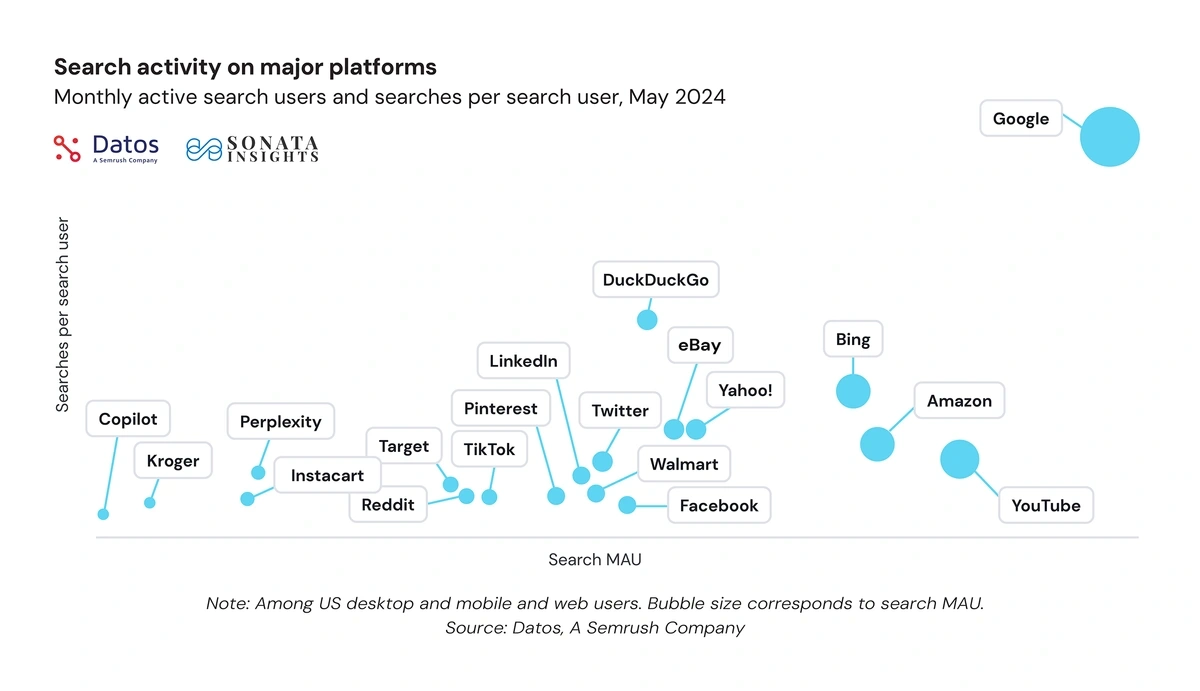
Contents:
Share:
SEO statistics can provide foresight, but they can also reveal prediction errors.
Case in point: the biggest SEO statistics story of 2025 was that generative AI would devour much of Google Search traffic by now. That has not happened.
Instead, Google continues to dominate. Monthly queries per user on GenAI platforms are a tiny fraction of those performed on Google Search.
And 99% of GenAI users still use search engines.
Below, you’ll find surprising statistics and some that reveal not much has changed.
Get a complete view of your competitors to anticipate trends and lead your market
Takeaway: Leverage projected SEO growth trends to future-proof your marketing strategy. Try Semrush today and get ahead of your competitors with the most trusted SEO tools in the market.
Takeaway: Many media outlets made false predictions of GenAI’s cannibalization of Google by 2025. Focus on the data and what impacts your prospects today.
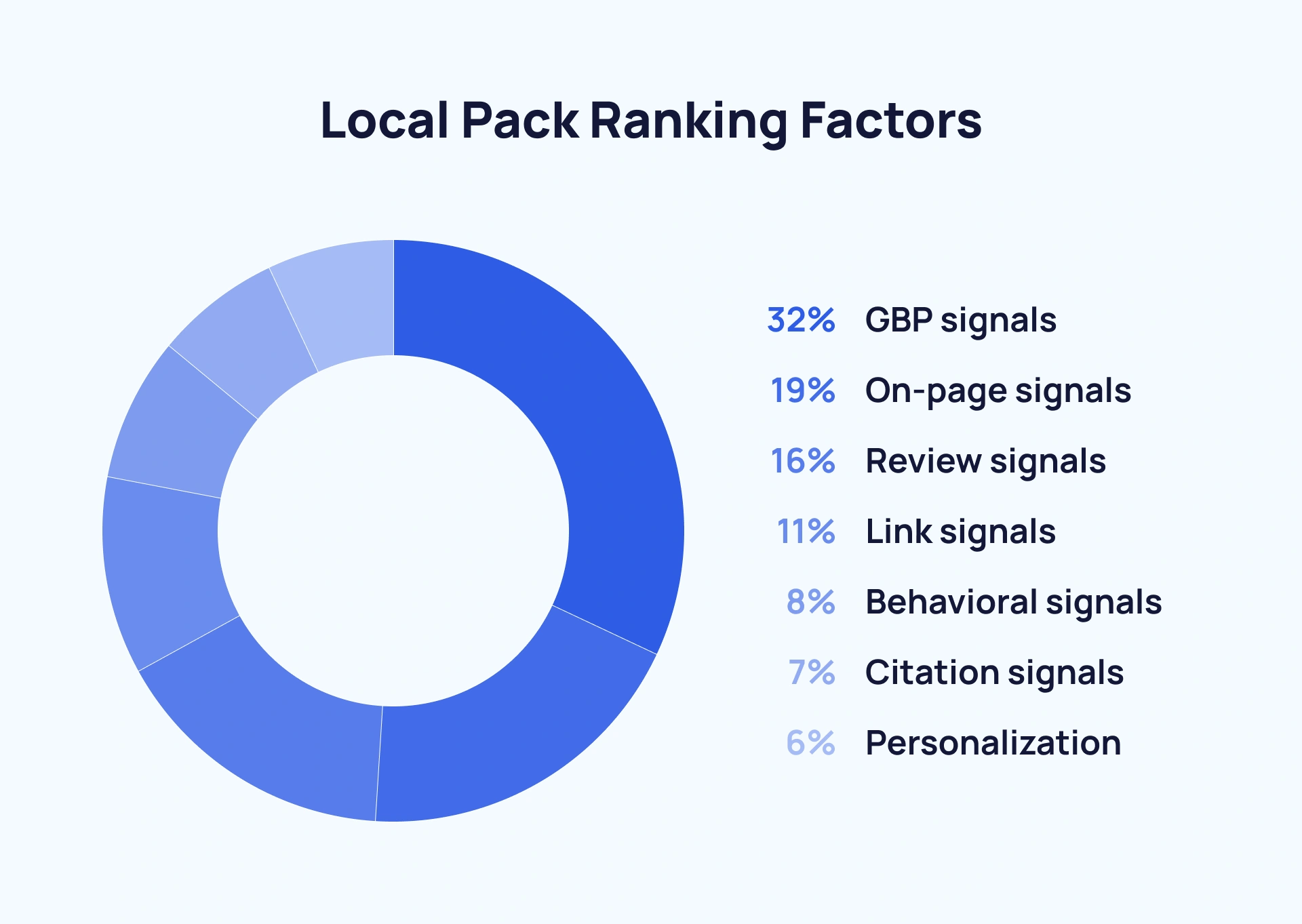


Use trending keywords to create content your audience craves.
Takeaway: Reports of Google Search’s imminent decline are popular but unsupported by data. Prepare to optimize for Google’s AI Overviews this year.
According to original research by FirstPageSage (FPS), the top-ranking industries per ROI on SEO are as follows:
Other leading sectors include:
SEO ROI timeframe: According to B2B SEO statistics, it takes anywhere from 6 months to a year to achieve positive ROI for an SEO campaign. Peak results are seen in the 2nd or 3rd year of the campaign, per FPS.
Takeaway: Targeting high-value, low-competition keywords is still key. (I call this “blue ocean SEO.”)
Takeaway: Google rewards excellence and originality. SEO marketing statistics suggest a continued focus on information gain over keyword stuffing.
Perspective: Link building is awash with mediocre guest posting initiatives that annoy prospects. Winning requires building a carefully differentiated strategy formed around high-quality blog posts.
A Whitespark survey of marketers asked how much weight Google attributes to various factors that impact Local Pack rankings.
Perspective: In my experience, small business owners often underestimate the impact of an optimized Google Business Profile and regular reviews.
Takeaway: Factor in screen sizes when planning your SEO strategy.
Perspective: In my experience, broken link building is still a great way to get more backlinks. It can significantly increase your site’s valuation. However, it requires meticulous attention to detail.
Takeaway: The rising popularity of voice search highlights the importance of long-tail keywords in SEO strategy, and careful keyword research is still essential.
Perspective: After production, don’t forget to optimize your YouTube videos by taking full advantage of the description field.
Takeaway: Simplify mobile site navigation and checkout. And automate requests for Google Reviews.
Because social media develops search trends of its own and because social referral traffic is often part of SEO strategy, we’ve shared related stats below.
Facebook is #1 in social media referral traffic. It drives 3.62% of all referral traffic in the U.S.
Here’s how the top social platforms stack up. (SparkToro / Datos)
Takeaway: With the steep rise in social commerce, digital marketers may need to adjust their social strategy to span more than brand awareness. Bluesky is likely to gain traction.
The future of SEO is likely to involve more AI-driven search. But it’s important to focus on data, not hypotheticals.
Most importantly, demand for SEO tools, like Semrush, is likely to surge in tandem with global SEO growth.
Use real-time topic data to create content that resonates and brings results.
Exploding Topics is owned by Semrush. Our mission is to provide accurate data and expert insights on emerging trends. Unless otherwise noted, this page’s content was written by either an employee or a paid contractor of Semrush Inc.
Use real-time topic data to create content that resonates and brings results.
Share
Newsletter Signup
By clicking “Subscribe” you agree to Semrush Privacy Policy and consent to Semrush using your contact data for newsletter purposes
Written By
Sherrie Gossett
Small Business Consultant
Sherrie Gossett has a knack for uncovering hidden trends and opportunities that others overlook, drawing on her extensive experien… Read more
Research shows that the value of LLM search traffic could overtake Google by 2028. Find out what this means, how to prepare, and more in this report.
Explore free SEO competitor analysis tools for marketers and uses cases. Includes ChatGPT for LLM-readability, Semrush and Exploding Topics for analysis.
Screaming Frog and Semrush are two widely recommended SEO tools—but which one is best? See how the two platforms stack up, and learn how to get an extended Semrush trial.
Use these proven strategies to improve your website SEO for higher visibility in traditional Google search and AI-driven results.
Compare Google Keyword Planner vs Ahrefs with our detailed analysis. Learn key features, pricing, and limitations to choose the best keyword research tool.
source